Grooming Dion

What is grooming? It’s about making sure the person or people you are going to abuse come to accept the abuse as normal. If done effectively, it not only affects the victim, but the people surrounding the victim as well. Others begin to see the behavior as normal and acceptable. This can be seen in Raising Dion with the character, Pat. Now, if you have not seen season one of Raising Dion and you do not want spoilers stop reading now.
Now that they’re gone let’s talk about the elephant in the room. Pat, Dion’s godfather and Mark’s best friend was the villain! How did people not see it coming? Well, I kind of did, but mostly because of watching “Unbreakable” and remembering Mr. Glass said that the villain and the hero often begin as friends. Also, Pat’s migraines seemed odd. However, the reason the characters on the show did not notice is not because they did not see one of the few good M. Night Shamalyan’s movies. It’s because Pat was able to groom the individuals around him into accepting his socially awkward and boundary breaking behavior.
For example, when Pat was told not to show up after work, there he would be, at the door, with a pizza. When he was told to go home, he would stay just a little longer. “Pat, don’t investigate this woman. I can handle it on my own.” Against, Nicole’s wishes he did it anyway. He consistently broke the personal boundaries of those around him, and rather than be called out on it, they often let it slide. Not only that, but they called on him to pick Dion up from school, take him to school, take him out for pizza, keep his secret from the hospital, and so much more until he began to be a necessity. Grooming is how abusers retain their power. They pray on the weak to the point where it appears their life is impossible to live without them. They make boundary breaking because it’s “needed” or they “want to help” or “they know best”. Pat knew Nicole did not have many people in her life to help with her son so he knew he that eventually he would find a way to become a necessity in their life. With Pat, he knew Nicole needed help with her son. With other abusers it could be that they know their victim needs money, time, a break, anything that relieves the stress of life, even if it means wavering on well established boundaries. But what happens when hard boundaries are finally drawn? Pat offers an example for this as well.
When Nicole tells Pat that he could not dictate her choices and that he could not be a part of Dion’s life, he became defensive and angry. He told Nicole, “I think you’re taking advantage of me.” He made himself appear to be the victim who is not appreciated for always being there, and always being willing to help. When this does not work he becomes angry. He lashes out, becomes controlling, and obsessive until his true colors as a villain are revealed. Abusers who groom their victims and have to live with established boundaries they attempt to make themselves appear to be the one who has been wrong and taken advantage of. Eventually, they become angry and obsessively controlling.
The goal of survivors is continuing to maintain healthy boundaries, no matter how hard the abuser attempts to weaken the borders. It is the only way to keep the Crooked Man out and save your inner Dion.
The Superman Facade and Childhood Sexual Abuse (Excerpt from "How to Conquer Your Superman")

The below excerpt is from my soon to be released guide for male survivors of childhood sexual abuse, How To Conquer Your Superman. The guide is still being written and revised. This means, I would very much like feedback to know what I do right, what I do wrong, and how I can improve. More portions of the book will be released over the coming months as How To Conquer Your Superman : A Guide for Male Survivors of Childhood Sexual Abuse using DC Comics Superman is planned to be released in March of 2020. Thank you for your support and valuable feedback.
The Superman Façade and Childhood Sexual Abuse
When you hear, Superman what image comes to mind?
When you hear “Man of Steel,” do you visualize a large red “S” emblazoned on a background of gold in the center of the superhero’s chest with matching perfectly curled “S” dangling from his jet-black hair?
How do you feel when you hear the phrase, “Look up in the sky! It’s a bird! It’s a plane! No, it’s Superman!?” Are you filled with hope and confidence that the day will be saved?
You may picture bullets bouncing off the chest of the hero as he swoops in, foils the bad guy’s plan for world domination, and flies away with a smile, never asking for a thank you in return. You may be filled with a sense of unwavering optimism in believing, beyond the shadow a doubt, that everything will work out fine, and good will triumph over evil.
It is for this reason that although Superman was the first superhero, and for many, he will remain the best. He does what is right rather than what is easy no matter how difficult the choice may be. He is a savior and a true hero who is always willing to sacrifice himself to save a single human life. He is strong, kind, confident, and unbeatable. In essence, he is perfect! With these qualities, it makes sense why children double knot bath towels around their neck and run through their home with fists in the air pretending to be the Big Blue Boy Scout.
Being Superman feels good. It feels right. Being Superman and possessing his abilities to run faster than a speeding bullet, and leap buildings in a single bound is everything a survivor wishes they could be and do. This is because, rather than feeling strong and confident like Superman, male survivors of child sexual abuse live in a constant state of fear, anxiety, stress, and worry. Ellen Bass explains in The Courage to Heal how many male survivors have been sexually abused as children tend to feel:
- Bad, dirty, or ashamed
- Different from other people
- That there’s something wrong deep down inside
- That if people really knew them they’d leave
- A pervasive sense of shame
- Alienated or isolated.
These feelings cause some survivors to:
- Hate themselves
- Feel compelled to be perfect.
These emotions and thoughts are the exact opposite of what it means to be Superman, and is why male survivors sometimes cope with the effects of these negative thoughts and feelings by creating a Superman façade to fake being confident and in control.
The Superman façade is born in an attempt to filter the interactions, thoughts, feelings, beliefs, and behaviors survivors feel about themselves and others through the lens of a savior and what is believed to be right in order to feel safe through predictability. The reason some survivors of childhood sexual abuse may create a Superman façade is because during early development, when consistency and routine are needed to develop confidence in themselves while build positive and secure relationships with caregivers and other adults, children who are sexually abused, or suffer a form of C-PTSD, live in a constant state of unpredictability and fear. These children do not, and often cannot, create secure attachments to adults and other individuals, losing the skills needed to create a positive view of the world. To cope, some latch onto the predictability and safety of superheroes, adopting the behavior of heroes to develop a Superman façade that lives by a “hero code” of their own creation.
Male survivors of childhood sexual abuse live in a reality of chaos, filled with fear, shame, guilt from their sexual abuse, and unreliable adults who are unable to provide protection and safety. However, in the world of superheroes and comics, whether on television or on art filled pages, heroes provide the predictability of safety. They follow a code of doing what is right and punishing the bad guys that they wish adults in reality possessed. No matter if a superhero has the ability to fly, move at lightning speed, or materialize objects with the help of a super-charged ring, each hero shares a code to protect the weak and consistency the child survivor needs. This “hero code” is an unwritten code that guides a hero’s actions, separating their behavior from that of a villain, informing the survivor how not to become like their abuser, creating a definition of safety that is not provided by caregivers. The “hero code” defines the core of a superhero’s character, while also dictating the rules need to function under the guise of a Superman façade. Without the “hero code”, both the hero and the survivor would be lost.
The male survivor who develops a Superman façade as a child survivor develops a black-and-white view of the world, filled with absolute beliefs of right-and-wrong. These young males latch on to the rules of their “hero code” for safety and predictability, but mostly because of the benefits associated with helping others while maintaining a sense of control. Seth J. Gillihan, PhD explains in Cognitive Behavior Therapy Made Simple how helping others leads to improvements in anxiety and depression symptoms. He states how researchers have found that:
- Focusing on others can distract from one’s own distress.
- Helping others provides a sense of meaning and purpose.
- Prosocial behaviors may cause the release of oxytocin, which is involved in trust and bonding with others.
- Doing nice things may stimulate the release of dopamine.
- Reaching out to others may lower activity in the stress response system.
Meaning, the Superman façade is an attempt for the survivor to
- be liked and accepted by others in an attempt to eliminate feelings isolation,
- ensure the survivor does not identify with their abuser in an attempt to not become a villain,
- latch on to predictable and positive examples of caregivers,
- hides their feelings of shame and guilt with smiles and kindness to eliminate feelings of shame and self-hatred.
To illustrate how the Superman façade can translate into a “hero code” male survivors feel obligated to follow there is no better comic to be used then Actions Comics #775.
Killing My Batman (Excerpt from "How to Kill Your Batman")
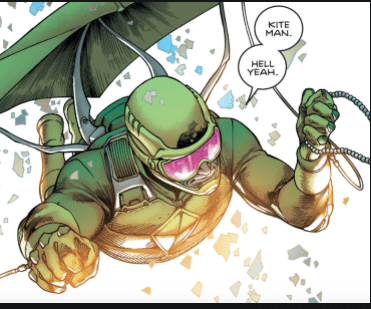
**Before reading this blog it is important to know that within the last few weeks my father has apologized. I will update my readers in the coming weeks and discuss “How to Save Your Superboy” in my soon to be released book How to Conquer Your Superman. **
How to kill your Batman is different for every male survivor. For me, it means learning to become a better man, husband, father, teacher, and mentor as a recovering male survivor of childhood sexual abuse.
When reading Tom King’s, Batman, the need to become a better man seemed to be a recurring theme in numerous issues. Throughout the series there were no perfect fathers, or father figures, but there were those who strived to be better men. For example, there’s a scene in Batman #6 when Alfred, dressed as Batman and driving the Batmobile toward a deranged Gotham. The butler talks to himself, as if to calm his nerves concerning the absurdity of what he is doing, about when he agrees to be Bruce Wayne’s Godfather. He says, before ramming the Batmobile into the former hero, Gotham:
Well, Thomas, allow me to be the first to say what an honor it is to be asked. For you, possibly, to entrust me with the care of Master Bruce. Well, sir, I am humbled. But of course the need for such care will never arise. It is not as if on some dark night you are going to just go walking down Crime Alley with Martha in her best pearls. That would be…absurd. But, if such unlikely circumstances were tragically to come to pass allow me to assure you that it will not be a difficult burden to bear. Bruce is such a good boy, sir, as you well know. Quiet and calm and yet still compassionate and curious. Caring for him will be more a pleasure than a chore, sir. A life of mild days reading books. Tranquil nights playing board games. Perhaps a charity ball now and then.
Afterward, Alfred jumps from the vehicle and confronts Gotham. While his actions are meant to bring a moment of comic relief, at any moment Alfred could be ripped in half, or disintegrated by the hero turned villain. Instead of running or refusing, the butler stood his ground and did something insane for his son, Bruce. His actions gave Batman the needed time to arrive and save the day.
Throughout this series, Alfred was more of a hero than Batman could ever be because the love he had for Bruce conquered his fear. By all intents and purposes, Alfred failed at raising Bruce. Rather than help the boy heal from his childhood trauma, he grew up to fight crime dressed as a giant bat. Although he did not succeed in raising Bruce, he did the very best he could, and continued to do the best he could as Bruce took on the role of Batman.
The villain, Kite Man, also comes to mind as a flawed, but still doing the best he can, father. During the “War of Jokes and Riddles,” Kite Man loses his son in Batman #27. Charles Brown becomes a pawn for Batman, the Joker, and the Riddler as each try to gain ground in the war. The casualty was Charles’s son, Charlie Brown, killed when Riddler sent a kite to the young boy with a rope laced in poison. The death of his son pushes Charles to become the villain, Kite Man.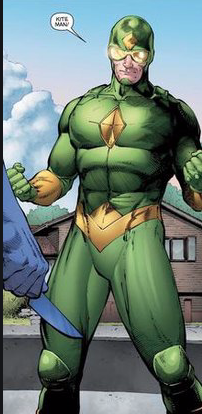
In no way was Charles a perfect father. In fact, he was kind of worthless as a father, but he still tried to be the best he could. In Batman #30, Charles narrates a conversation with his son, as he continues to be pulled from one side of the war to the other, like a kite in the wind. The conversation shows how Charles is viewed by other characters in the comic, but not his son.
Charlie:Daddy, can I tell you something?
Kite Man: Sure, Charlie. What’s up?
Charlie:Mommy was talking on the phone I don’t know to who.
Kite Man: Okay.
Charlie:And she said…well, she was talking about you, and…well, Mommy said you’re a joke.
Kite Man: What?
Charlie:Why did Mommy say you’re a joke?
Kite Man: She said that in front of you. That I’m a joke.
Charlie:Well, it was on the phone. That time. She said it before, too. That was probably
in front of me. She says it lots.
Kite Man: Your mother shouldn’t–don’t worry about that, Buddy. That’s not your business.
Charlie:But, Daddy…are you a joke?
Kite Man: Your mother didn’t mean that like it sounded. It’s fine
Charlie:It sounded like you’re a joke. Is Mommy a liar?
Kite Man: I mean, she didn’t — I mean, maybe she’s not a liar. No. Okay. Sometimes I am. I guess. I play with kites too much, and your mom is — she does a lot of stuff for you. So maybe she’s right.
Charlie:Are you a joke, Daddy?
Kite Man: I mean, look, buddy, here’s the thing. I try a lot of things. And I’m not always good at them. And when I fail, people laugh. I get it. It’s funny to watch. Like I’m slipping on a banana. And maybe when they watch and they’re laughing, they say, “He’s a joke.” I’m a joke. And so I guess I am. But what am I supposed to do? You know? I’m supposed to just quit? Just so they stop laughing? Just so they don’t call me a joke? There’s an old story. I ever tell you this? Like a guy is pushing this boulder up the top of this hill. And he’s cursed. So, like, every time he gets it right to the top, it rolls down. That’s the curse he never makes it. But he has to get it up, so he goes back down and gets it and does it over. Pushing it up again. Watching it fall over and over. Forever. That’s a joke, right? It’s funny. Right at the top, he’s happy and…whoops! Ha ha ha. Ha. Ha. And that’s me. That’s all of us. We’re all just pushing a boulder. Whatever we’re trying, we’re going to watch it fall, we’re going to hear them laugh. Right at the top of the hill. All of us. We’re all jokes. But the thing is, right, you got to laugh, too. It’s the only way. I mean, you got to laugh with them. Okay, I’m a joke. I’m a joke and I’m funny! Then you’re laughing with them. And if you’re laughing with them. Then at least your laughing.
Charlie:Daddy, you know how I don’t like to fly kites ‘cause I can’t get them to fly?
Kite Man: Yeah. Y’know I can show you.
Charlie:You want to go outside and do the kites? Like now?
Kite Man: Really? Charlie, you want to go fly them? With me?
Charlie:I never get it up. It’ll fall, I know. But if it falls, then I’m a joke. And I can laugh. We can laugh, right? Me and you, Daddy. It’ll be funny.
Kite Man: Yeah, Charlie. It’ll be hilarious.
While flying the kite, Charles asks his son if he liked the kite. His son’s response was, “hell yeah.” Charles tells Charlie that “hell” is a bad word. The father explains to his son how his mother and grandmother said when he was a child that if he said the word then he might go to that place. Before dying in the hospital, Charlie asks his father if he was going to go to hell because he said the bad word. Before Charles could answer, Charlie dies. So, while it may seem to be a running joke that every time someone says, “Kite Man” the response is, “Hell, yeah,” it is actually in remembrance of his son.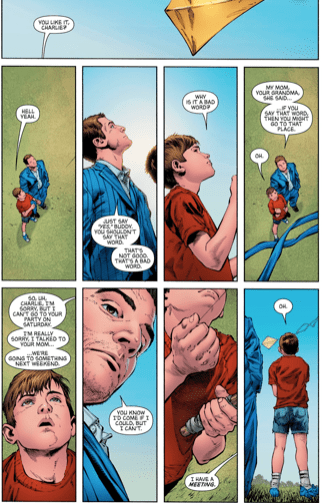
No, Charles was not the best father, but the love of his son was evident. He tried. Failed. And tried again. When Charlie died, Charles became the villain, Kite Man, only to get close enough to the Riddler to avenge the murder of his son. In the end, when it was all over, Charles was lost. He continues as a villain only because he does not know what else to do. Again, a father doing the best he can with what he has.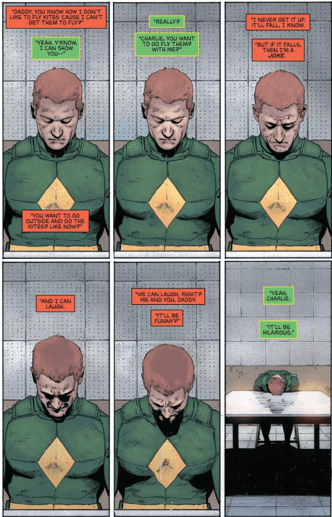
Thomas Wayne telling his son, Bruce, to no longer be Batman so that he can happy. Bruce attempting to protect his sons from Bane’s wrath by telling them to leave Gotham until the trouble has passes. All of them make me wonder why my father, who claims to do (and did) the best he can, will not apologize for telling me to forget the sexual abuse committed by my sister from eight to ten-years-old.
Better Man
A number of years ago I told my father that for two years I had been raped by my sister (his daughter) from eight to ten-years-old. After explaining the details of the sexual assault he told me, “Forget about it. It’s in the past. The best thing you can do is move on.” Rather than cower and continue to harbor the secret I had been carrying for over twenty years, I responded with defiance and honesty.
I told him that I couldn’t forget. The abuse was something I had to live with every day and that it could not be forgotten.
He apologized, hung up, and did not speak with me for nine months. It was not until Daniel (my brother) told him that he needed to start talking to me that my father proceeded to text and talk with me as if nothing had happened. The illusion of normalcy was not something I could return to, so I asked my father for a written letter apologizing for abandoning me after I told him about my sexual assault. Rather than reply, he responded back via text. He said:
Okay son. I will respect your request. You are a grown man and able to make your own decisions. I’m glad you are doing better and I’m really sorry to hear about Sarah’s brother. Let me say this…I love my kids the same. You, Daniel, and _____are my life. I don’t love one no more or less than the other one. If I could take your hurt I would. I can’t so I can do only what I am able to do. But remember this. We can only start healing after we forgive. If I could change things I would. I’m sure your sister is hurting. I’m sure she had no intention of hurting you. Then or now. She has to live with the fact of what she did and face everyone who read your book and label her a rapist. This has to be really hard for her. I’m sure this has been really hard on you. I can only imagine how hard it has been. I know my kid and know you are strong. You can and will overcome this. It’s in the blood. No matter what you think, this too will pass. If you need me I will always be there for you. Don’t be a stranger. I don’t want you to one day think I missed out on a lot of my family’s life. She, Daniel, Tina (my mother) and me are your family. Love you unconditionally. Da
In Heroes, Villains, and HealingI analyze what this message means, the impact it had on me on me then, and the possible thoughts of my father after writing it. Since my father sent that message, I have yet to receive a letter of apology, but I have spoken with him.
This past August, Daniel (my brother) called to let me know that my father was having serious medical problems and not managing his diabetes. Photos of my father’s legs forced me to call in an attempt to tell him to stop being stubborn and go to the hospital. I lied and said I had already called an ambulance, but he still refused. After making a series of excuses about not having the money and going to VA Hospital, I became angry. Really angry! His pride and stubbornness pushed me over the edge. I began cursing, telling him how he did not prepare me for how hard life could be. Through tears, I told him how my wife and I had almost gone bankrupt attempting to survive paying for daycare and continue to work on the salary of two teachers. How fear of losing our house in Baltimore the same way I had last my home in Peoria made me stubborn, just like him. To survive we sold our home and moved to Ohio to be closer to family. I explained how we were living with my in-laws and attempted to articulate my anxiety, fear, and feelings of being a failure as a father and husband.
I yelled.
Screamed.
I begged for an answer.
Why would he not apologies for leaving me alone when I needed him the most? His response: “I can’t do something I don’t believe is right.”
My world stopped.
Until that moment, I believed, beyond a doubt, that maybe my father did not understand what I wanted from him to do to begin to repair our broken relationship. I thought that maybe be believed the text message he sent constituted an apology. His response proved that I was being naive.
There were no more tears as I heard him say, “It’s good to hear your voice.”
There was no more emotion as I heard him ask, “How are my grandbabies doing?”
I knew I had lost my father.
Afterward, I told him to take care of himself, and hung up the phone.
In the home of my mother and father-in-law, after selling my home, and ending the career and life I had made with my wife and children, I cried. I mourned the loss of my father. I mourned the loss of my childhood. I mourned the loss of my family of origin.
I have never felt so alone and like such a failure.
My father has often attempted to justify his actions told me, “I did the best I could.” I know now, this is not true. As a father, I look into the eyes of my daughters and my heartbreaks at the thought of not having them in my life. I love them more than I ever believed I could love another human being. If they needed my life, it would be theirs. My life istheirs. This is why I do not understand why my father will not apologize. If he loved me, if he did the best he could, he would do whatever it took to remain a part of my life. Instead, his pride, hypervigilance, and idea of manhood defined by the “boy code” keep him from saying three words; I am sorry.
I’m sorry for not showing up to your high school graduation.
I’m sorry I never paid the mortgage, ran away to Alabama, and you and your mother were homeless for two years.
I’m sorry the fights I had (physical and verbal) with your mother and brother ripped our family apart.
I’m sorry I didn’t protect you from being raped when you were eight-years-old.
I’m sorry I didn’t protect your sister when she was raped by Mr. Miller.
I’m sorry I told you to forget what happened to you.
I’m sorry you were raped.
I’m sorry I wasn’t a better father and husband. I could have done and been better.
These are the words I will never hear from my father. His Batman will live until the day he dies.Each day, my daughters and my wife kill a little more of my Batman. With each kiss, hug, and I love you, my Batman fades from existence. I attempt to conquer my hypervigilance to be a better father, husband, educator, coach, and mentor. Each day I fall short, but each morning I rise to try again. My Batman will never fully die, but I will always attempt to be a model for those striving to be, become, and know a better man.
Martian Manhunter: The Healing Process (Part 1)
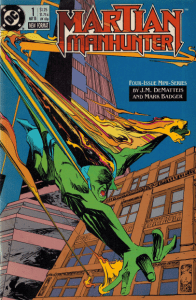
Just after Christmas, my grandmother, Mamaw, told my wife to tell me to come over and look through the comics in her basement, knowing how much I love superheroes. I knew my uncle, Rich used to work at (maybe own) a comic book store, but I had no idea any were left over from his heyday, or the number of comics she had in her basement! On the way over to visit I expected to find maybe a box or two of really bad comics no one had ever heard of or wanted. I was pleasantly surprised to much more. It was like Christmas had come again! In the collection there were some real gems, a handful worth a few bucks, but the one I was super giddy to find and prized above all the others was the Martian Manhunterfour-part mini-series published in 1988, written and drawn by J.M. DeMatteis and Mark Badger.
I was not pleased to have these comics because their monetary worth (which is none) but because when I researching and writing Heroes, Villains, and Healing, I wanted to include a chapter on Martian Manhunter, but could not find a solid source to use as a reference. What I knew about the hero came from the television shows Justice League andJustice League: Unlimited, but not enough to connect to understanding the trauma of childhood sexual abuse.The animated series, and what I had read of the hero in Justice League, Martian Manhunter loneliness and isolation appeared more intense than Superman’s because he was not raised on earth and, while both Clark Kent and J’on J’onzz are both aliens, J’on never felt as connected to the people of earth as Superman. All of this made me want to understand his origins and how he became the sole survivor of Mars. The little information I could find on a Martian Manhunter comic was the before mentioned mini-series, which I could not find. You can imagine my joy at having found all four parts in-tact and in excellent condition.
After reading the comics I knew I was right to want to include Martian Manhunter in Heroes, Villains, and Healing.These comics detail with remarkable precision the stages of the healing process survivors go through when attempting to recover from the trauma of sexual abuse. This makes them excellent material to help male survivors understand the stages of the healing process. Because I did not include them inHeroes, Villains, and Healing I will discuss and analyze the four comics in the next four blog entries over the next four weeks. However, before beginning, it is first important to know the steps of the healing process, and who the Martian Manhunter is before addressing the steps that will be analyzed in issue #1 of Martian Manhunter.
Steps of the Healing Process
In my self-help guides for male survivors of childhood sexual abuse, Heroes, Villains, and Healingand How to Kill Your BatmanI explain the steps of the healing process. In these guides I explain how the healing process is similar in the stages all survivors must progress through if they wish to heal, but different in how each survivor reacts to those stages. This is because no two individuals are the same, and so, no two sexual abuses are the same. The healing process is also not meant to be a straight line, allowing the survivor to move from start to finish in a set amount of time. J’on J’onzz demonstrates this throughout the four-part series Martian Manhunter as he attempts to deny the trauma of his past while it pushes to be remembered. Although there is no definite beginning, middle, or end to the healing process, research has revealed that thirteen steps are usually associated with the healing process. According to The Courage to Healby Ellen Bass, these steps are:
- The Decision to Heal
- The Emergency Stage
- Remembering
- Believing It Happened
- Breaking the Silence
- Understanding It Wasn’t Your Fault
- The Child Within
- Grieving
- Anger
- Disclosures and Truth-Telling
- Forgiveness
- Spirituality
- Resolution and Moving On
- The Emergency Stage and the Decision to Heal
- Remembering and Believing it Happened
- Grieving and Anger
- Understanding It Was Not Your Fault and Forgiveness
- The Child Within
- Disclosures, Truth-Telling, and Breaking the Silence
- Spirituality, Forgiveness, and Post Traumatic Growth
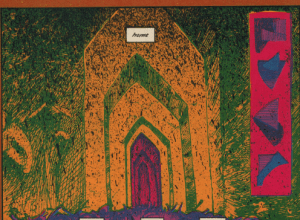
In this blog entry, I will be using Martian Manhunter #1 to explore the Emergency Stage and the Decision to Heal. It is also important to note that throughout all four issues there is a continuance presence of spirituality that is not fully understood until issue #3.
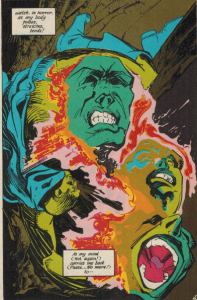
Martian Manhunter / J’on J’onzz
To understand this blog you must not only know the stages of the healing process, but also who the Martian Manhunter is as a hero of the DC universe.
When the Martian Manhunter appeared on the scene in Detective Comics #225“The Strange Experiment of Dr. Erdel”, creators Joseph Samachson and Joe Certa made one of the most interesting and powerful characters of the DC universe. During this Silver Age of comics, readers were told that J’on was the last Martian in existence who was pulled across time and space by a machine developed by scientist Dr. Saul Erdel. Unfortunately, the shock of seeing and meeting a Martian killed Dr. Erdel, preventing the hero from returning home. Trapped on Earth, the Martian decides to fight for justice as the Martian Manhunter, adopting the name J’on J’onzz as his alter ego.
J’on’s superpowers includes the ability to shape shift, fly, and telekinetic abilities. He also can become invisible with the ability to move through solid objects. His one weakness is fire. While this weakness may appear to be ridiculous in comparison to so many of his awesome super abilities, why this is his weakness is explained in the four-part mini-series. To tell you anymore would be spoilers, and everyone hates spoilers!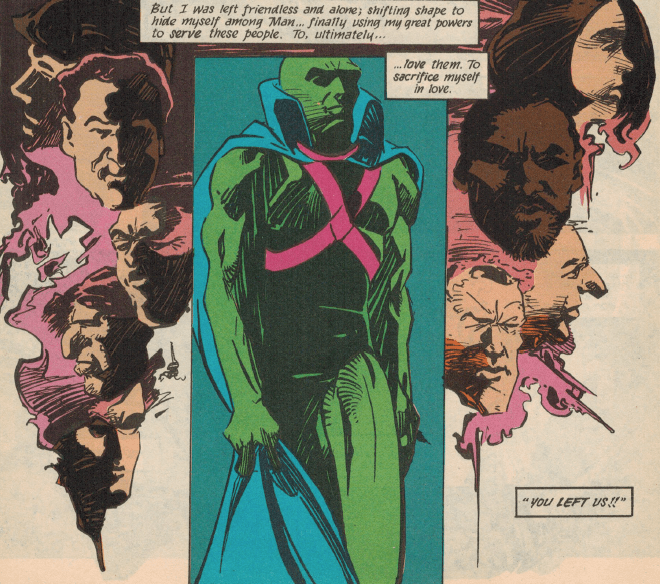
Martian Manhunter #1 “Fever Dream” (1988)
The Emergency Stage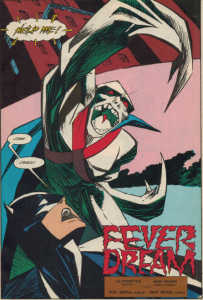
The comic begins with Batman. While attempting to catch a criminal, J’onn appears from the shadows, screaming for help and resembling more of a demon than a hero. Batman manages to get J’on to the Batcave. While unconscious J’on says:
It’s inside me. I know it. I can almost see it. Touch it. Taste it. Yet I don’t know what it is. How many years has it lain there, twisting, like a child in the womb … turning … kicking…I’m so afraid.
If I had to describe the Emergency Stage of the healing process in the form of a comic, this is one of the closest depictions of the sheer terror, confusion, and dissociative episodes a survivor can experience (the other closest example if the “Vermon” series of The Amazing Spider-Man).
The Emergency Stage cannot be put into words. The only and best way to describe it is sheer panic. It is fear that cannot be rationalized or pushed away. I have entered the Emergency Stage twice in my life. The first was during the first week of college. After being homeless for two years, and finding a way to get out of that situation (not to mention the domestic and sexual abuse of childhood) I was finally safe. Unfortunately, the safety of my dorm room meant my mind and body believing the traumas of the past could now be addressed without going insane. This panic and fear caused such gut-wrenching pain in my stomach, making me believe I was going to die.
The second time I entered the Emergency Stage was after my daughter was born. My wife and I had just purchased our first home and I had a new English position. I was the safest I had been in all of my life, hence why I entered Emergency Stage for a second time after not fully coming to terms with my past trauma years prior. J’on’s feeling of safety and mind and body’s readiness to enter the Emergency Stage is evident when he says to himself:
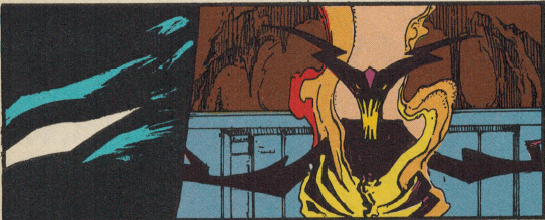
I’ve been on this world for…how many years? I can’t say for sure — but long enough to be comfortable here. As comfortable as a Martian could ever be among men. I’ve been on this world, protecting her people, risking my life again and again in the name of justice. And I’ve never known fear (except in sleep). I’ve never run (except in dreams). I’ve never been gripped by terror (except in the moments when that vague, unameable something reared up in my mind). But now, awake, alive, whole — I fear, I run, I’m terrified. Now I tremble like a child by imaginary monsters.
Like J’on, you may have built yourself to be strong as an adult man, but inside you feel afraid and weak due the trauma from your childhood. Like J’on, this fear may only visit you when you sleep, making you feel like the boy who was victimized as a child. As a boy maturing into adulthood, the only option you may have had to survive was to push the pain of the trauma away and this is fine. You did what needed to be done to cope. Unfortunately, like J’on there is only so long the past can be pushed away before it rises to the surface, but not until the mind and boy know it is safe enough (consciously or unconsciously) to come to terms with the trauma of the past.
The Decision to Heal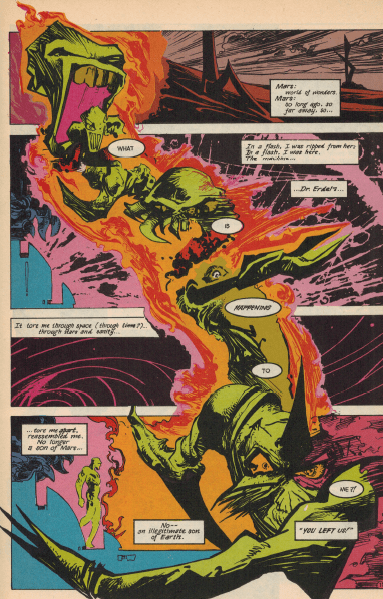
After entering the Emergency Stage, the survivor must make the Decision to Heal. Here, the survivor can choose to either ignore the past trauma, or begin the process of recovery. Until the survivor makes the decision to heal, they will continue to return to the Emergency Stage. Many male survivors, unsure of what it happening to them and why attempt, to explain away the panic. Unfortunately, this is not only true of male survivors, but doctors and therapist who can make the mistake of misdiagnosing C-PTSD. Both survivors and their caregivers have the potential to treat the wrong symptoms causing more confusion and denial of past trauma. Rather than make the decision to heal, J’on and Batman attempt to explain the pain and the hallucinations away. J’on thinks to himself: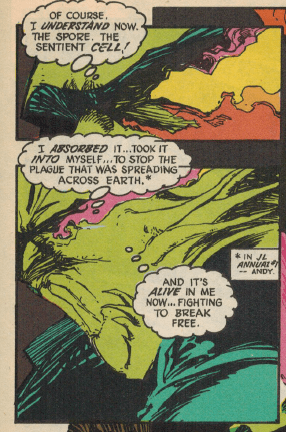
Of course. I understand now. The spore. The sentient cell! I absorbed it. Took it into myself to stop the plague that was spreading across the earth (from a previous Justice League comic). And it’s alive in my now. Fighting to break free. That’s why my body’s undergoing these distortions! That’s why I’m burning with fever! Then Batman was right. That thing I thought was after me. It was only a creation of my fever.
J’on does what many men do when faced with the reality of their past trauma. They attempt to fight the dissociative episodes and flashbacks by attempting to “become stronger”.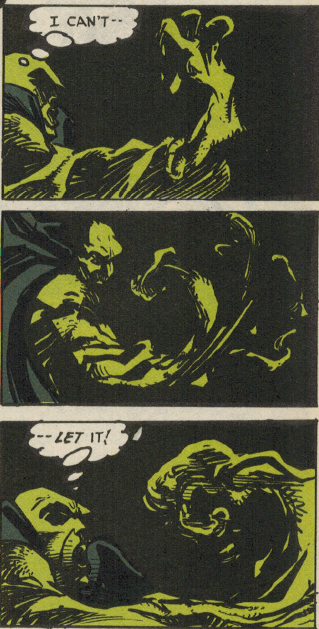
They fight!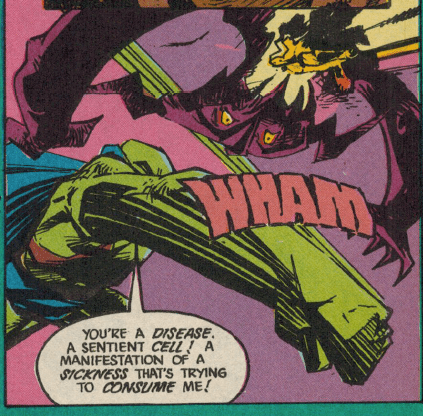
They claim the dissociative episodes in the form of flashbacks are not real and did not happen!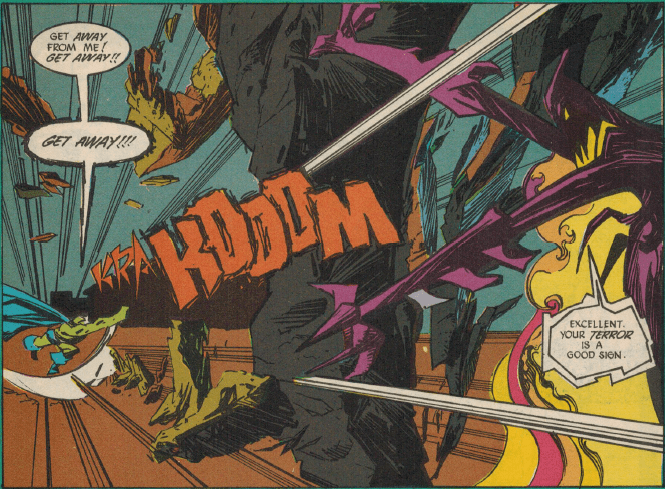
They become angry!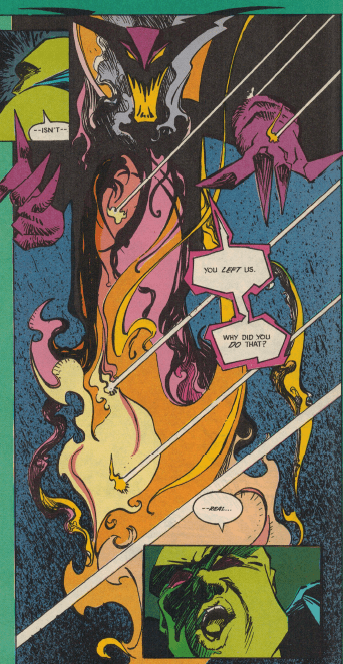
They push those they care about away.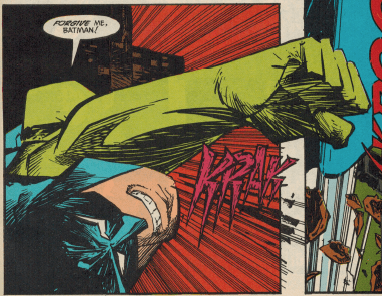
While the survivor says this is to “keep others safe”, it is really to ensure no one sees them distorted, weak, and hurting, when all their friends want to do is help.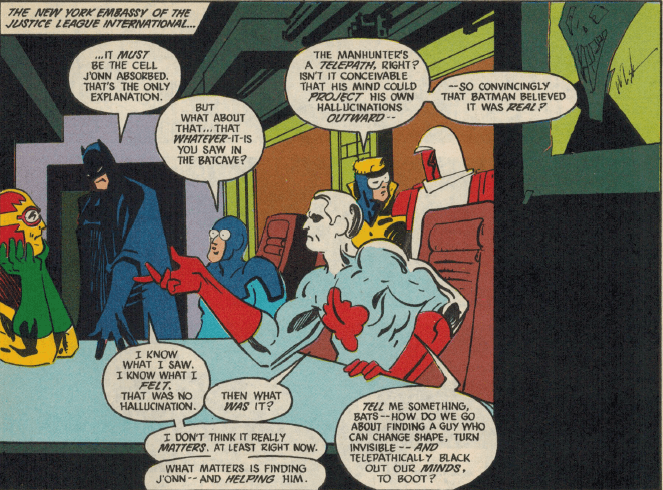
Until the survivors makes the decision to heal, the past will not be silenced.
Spirituality: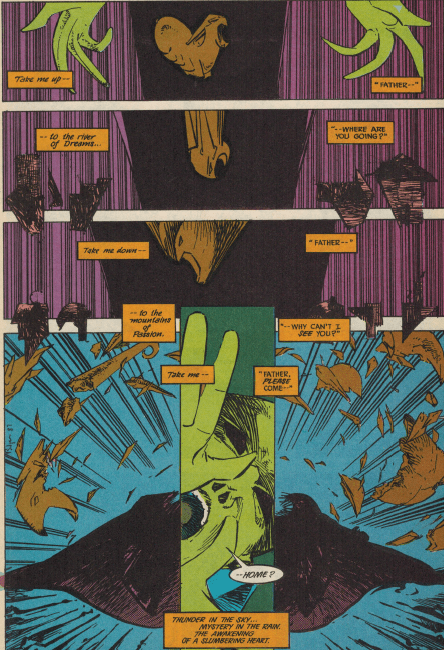
Martian Manhunteris a unique comic to read. It is beautiful, producing hard lines, grit, and muted colors that can only be found in true 80s fashion. There is also an element of spirituality to the depictions of J’on’s dissociative episodes. Many graphics, while being made up of smaller images, come together to create larger pictures that resemble churches and evil demons. All of these objects make the reader feel connected to something they cannot explain, but hope to eventually understand. When entering the healing process as a survivor, it can feel unique, spiritual, and larger that life. The only option is to do as J’on does. Continue to hold on, putting it all together one piece at a time until, eventually, it all makes sense. I wish I could tell you more about the connection to spirituality throughout Martian Manhunter, but – spoilers. More will come into focus in the blog next week.
Next week, the blog entry “Burning Bright” will address remembering past trauma while continuing to examine the Emergency Stage and the Decision to Heal.
Martian Manhunter: The Healing Process (Part 2)
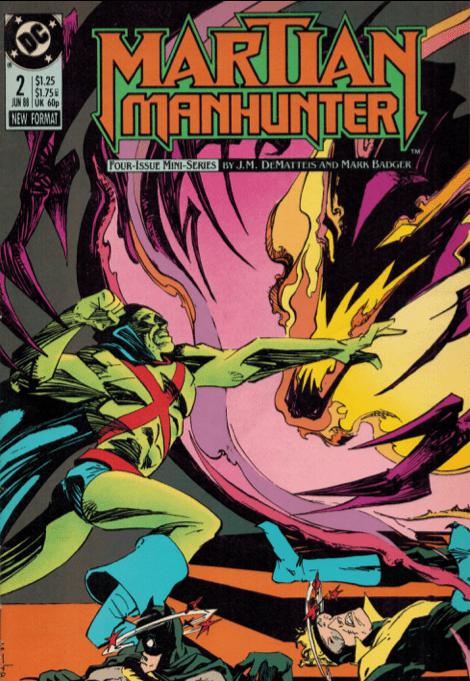
During the Emergency Stage, survivors often wonder, why now?
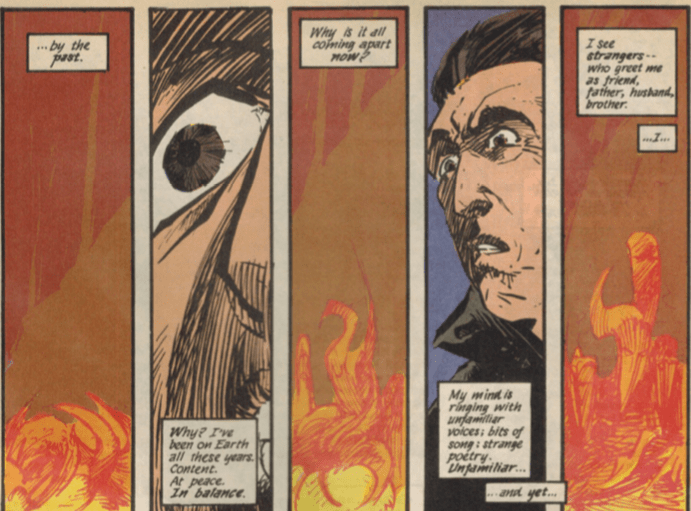
Flashes from the past, snippets of memories that make little to no sense, haunt them when they are awake.
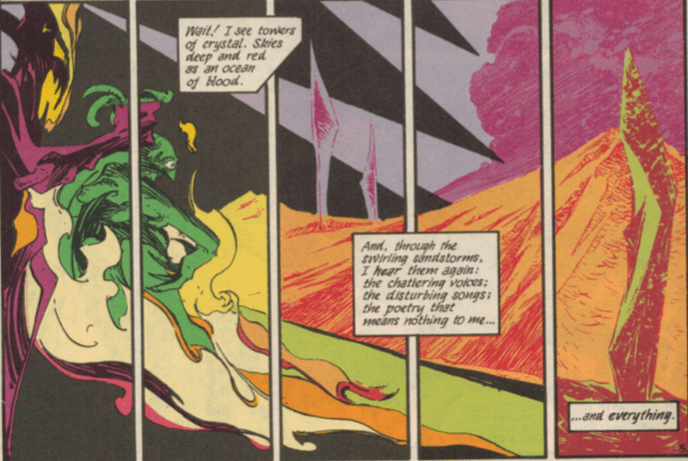
As a male survivor, when I entered the Emergency Stage I tried to think my way out of the situation. Like J’on J’onzz I considered myself an intellectual who was able to piece together clues to find a logical answer to a question. The only problem is, during the Emergency Stage logic is not the driving force; feeling is.
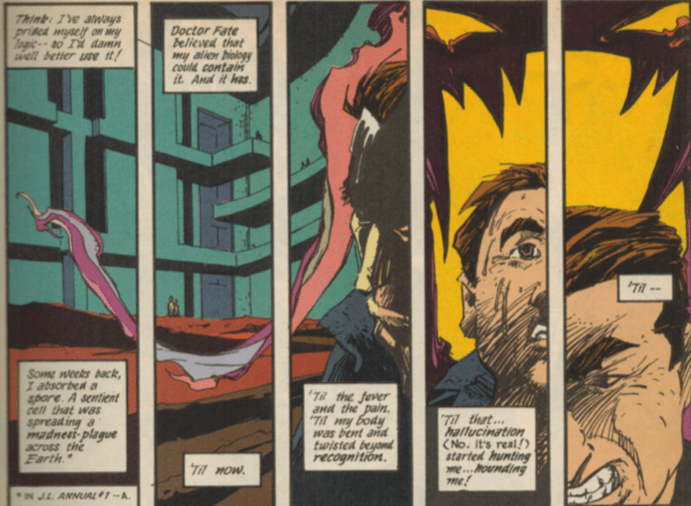
Dr. Basil Van der Kolk explains in The Body Keeps the Scorethat when immersed in a fight-or-flight circumstance, the brain is operating with responses from the amygdala. This is one of the “ancient” parts of the brain that cannot be reasoned away. He explains that “if the interpretation of threat by the amygdala is too intense, and / or the filtering system from the higher areas of the brain are too weak, as often happens in PTSD, people lose control over automatic emergency responses, like prolonged startle or aggressive outbursts.”
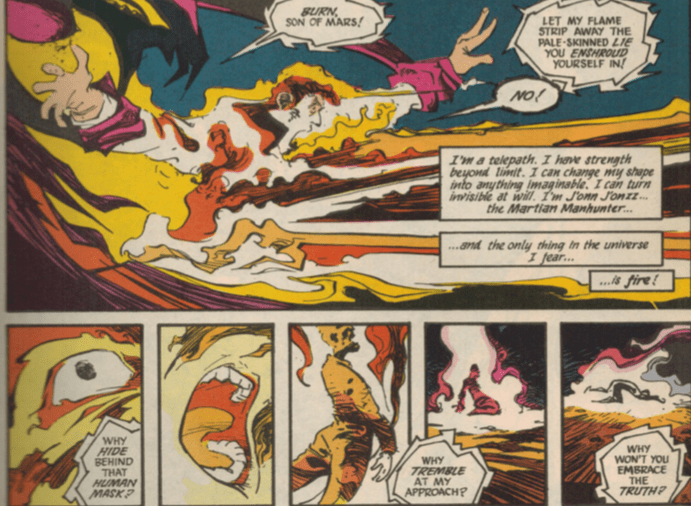
The feeling of panic does not go away.
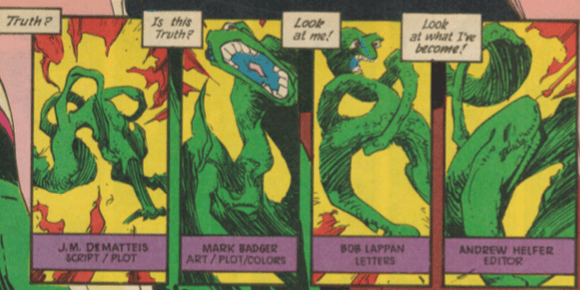
Making you feel like an alien in your own skin.
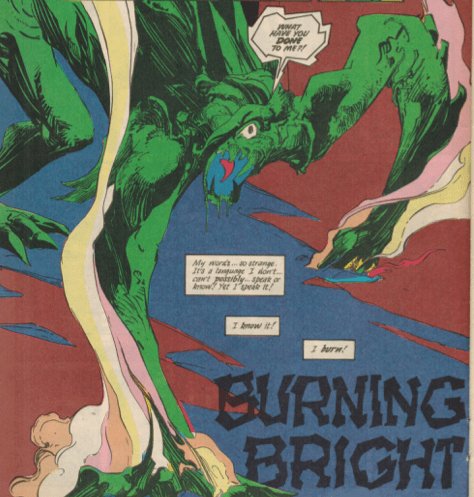
We wish for it all to stop, but instead the visions, flashbacks, and memories come one after the other.
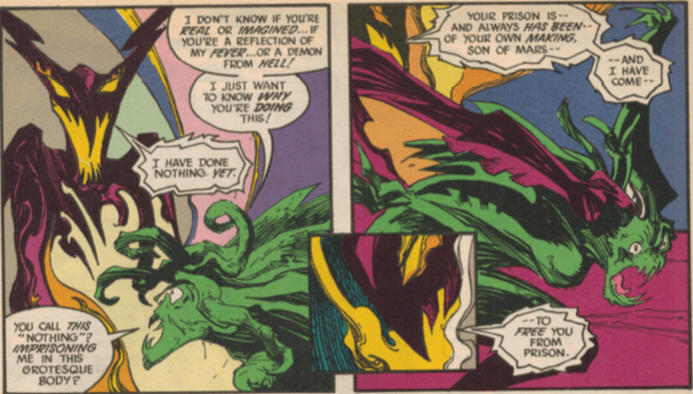
And when the begin to make sense we push them away, afraid of what the visions mean about the truth of our past trauma.

We fight!
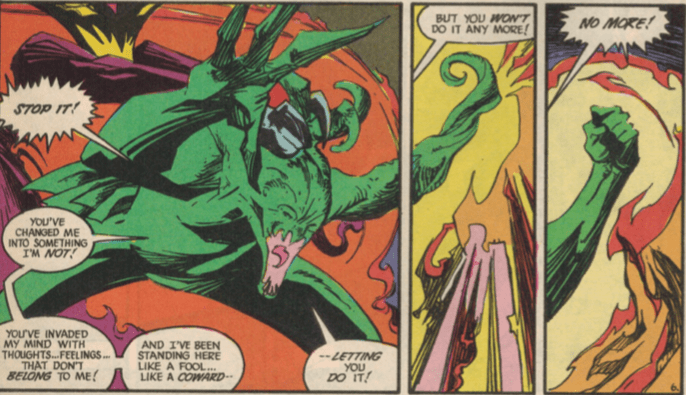
We deny!
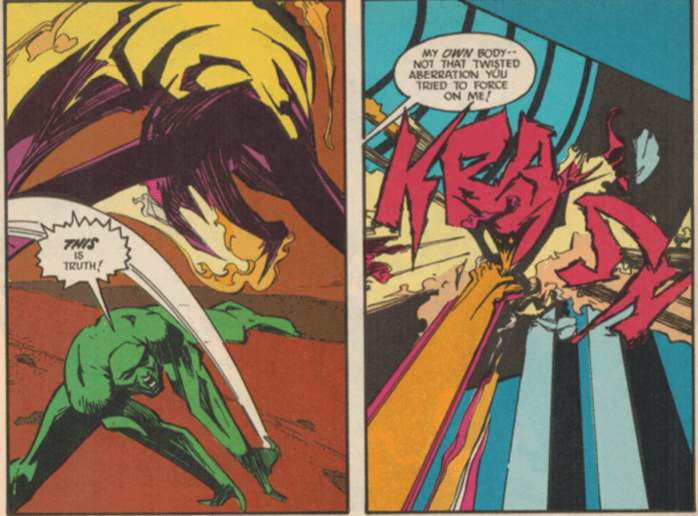
We run!
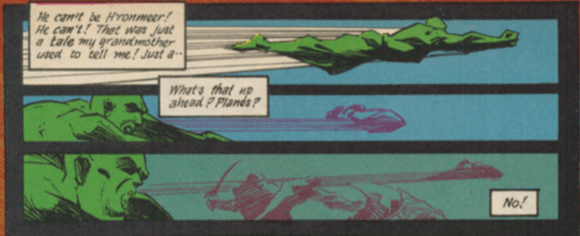
We believe that maybe the best option is to end our life. At least then the pain would come to an end. The visions would stop.
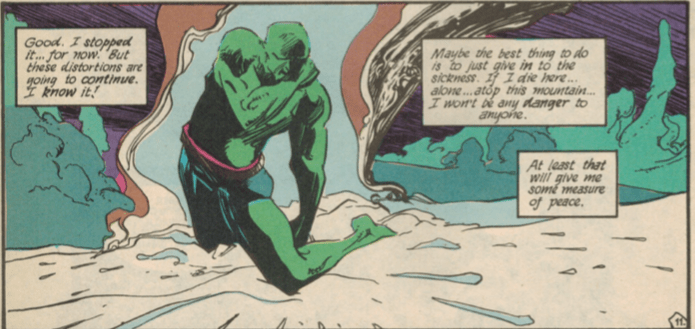
We hate the images, but they do not hate us. They simply want to be remembered. They want to help. They want you to heal.
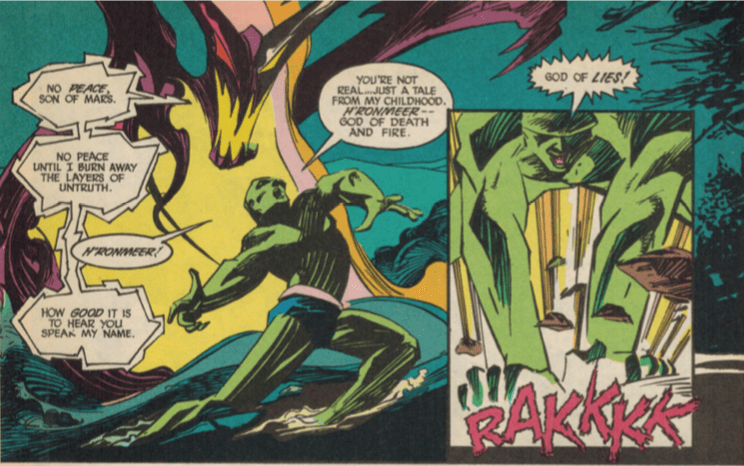
We fight until we can’t fight anymore.
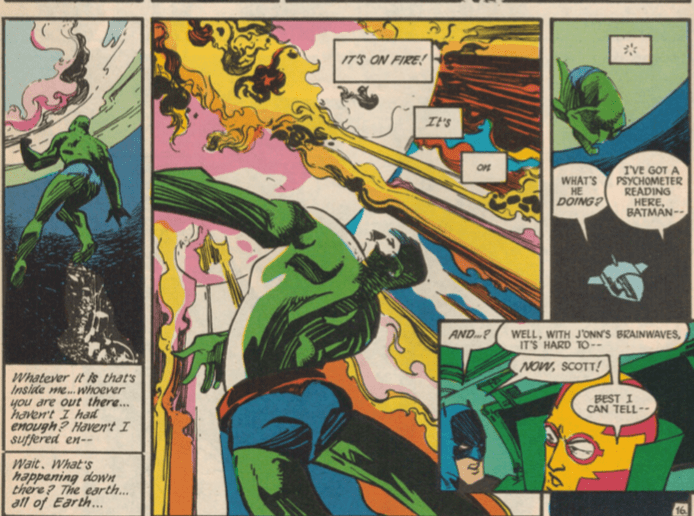
We fear the truth will hurt those closest to us –
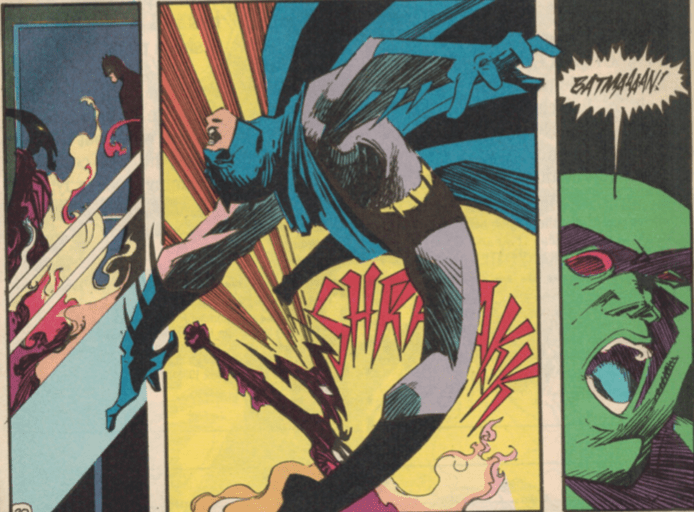
turning those that were once friends into enemies.

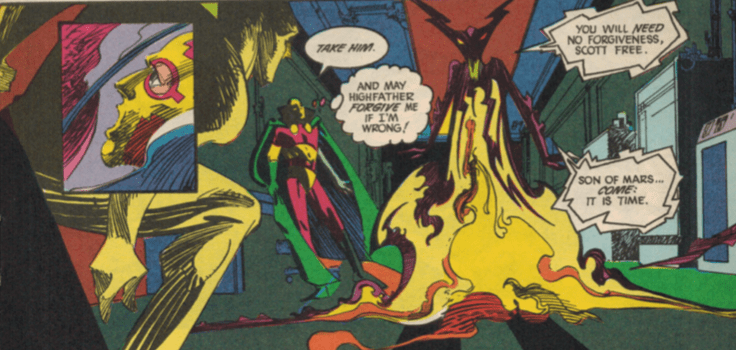


That is, until we find the one who allows us to be weak to grow strong.
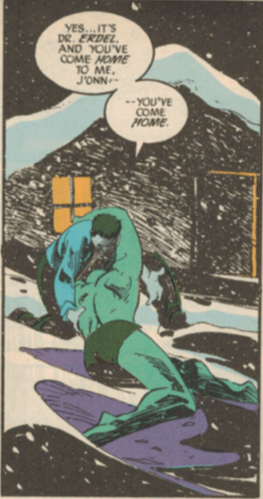
To be there when we need them the most. To guide down the path of finally making the decision to heal.
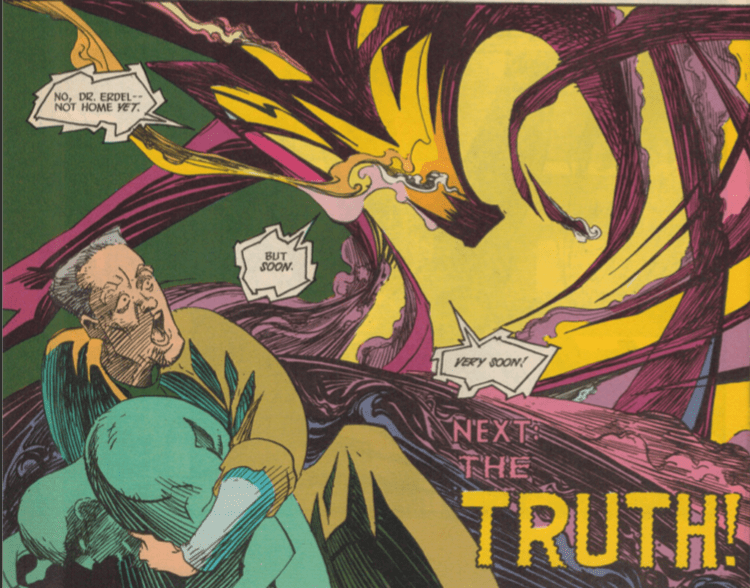
Martian Manhunter: The Healing Process (Part 3)
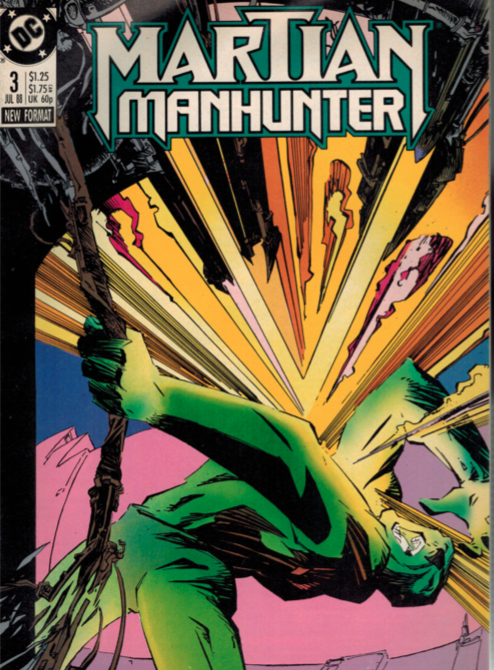
As survivors of trauma, we push away the past. We tell ourselves that the way we are feeling and behaving is due to something else besides the trauma. We tell ourselves, “It was something I ate,” or “It’s because I haven’t hit the gym in a while. That’s why I’m so irritable.” In fact, this may be true. Feelings of anger, frustration, anxiety, fear, and memories of a past we can’t explain may return because the coping mechanisms of the past no longer become effective. The “runner’s high” isn’t quite the same, or the yoga session wasn’t as fulling as it had been before. This is because the past is pushing back, fighting to be remembered. 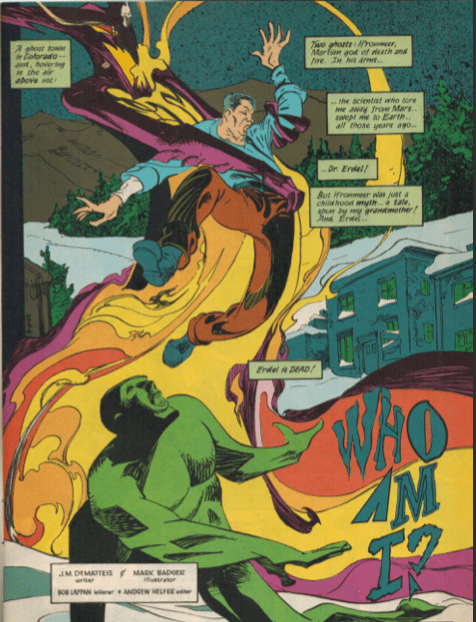
We ask ourselves, “Why is this happening to be?” or (in J’on’s case) “Who am I?” We question our existence and whether or not we deserve to be alive as questions of the past cause us to question our role and place in the lives we have built.
We may attempt to cope in a way similar to J’on who copes with his past by denying it has happened. Similar to Batman, he remains hypervigilant in his belief that he can not only control and fight the creator, H’rommeer, that is attacking him, but control himself as well. He refuses to remember and believe it happened. He is stuck in the first stage of the healing process.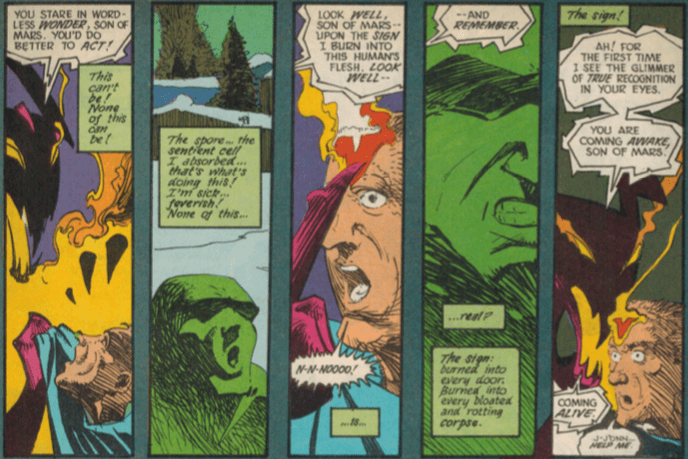
Like J’on, we feel like a failure. 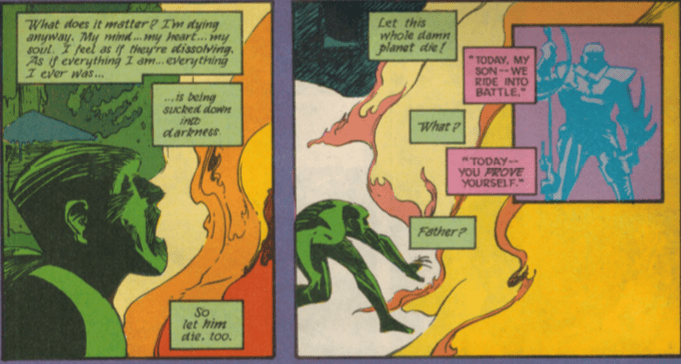
We feel weak. 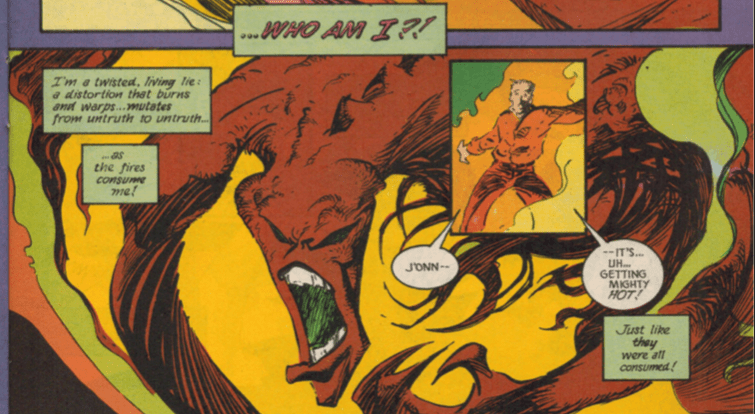
We feel vulnerable.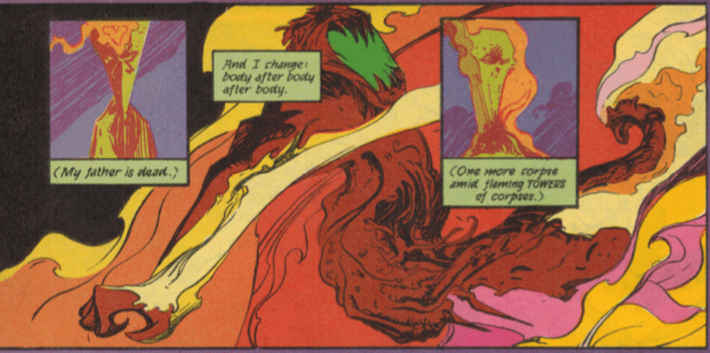
He fights he maintain his form in the same way we fight to “hold it together.”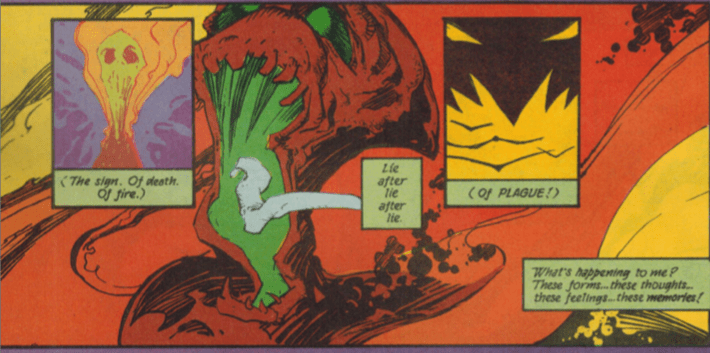
And we wish for things to return to the way they were before. We pray for the memories to fade and return to who were. We ask, “Why isn’t this working the way it used too?” There are numerous reasons.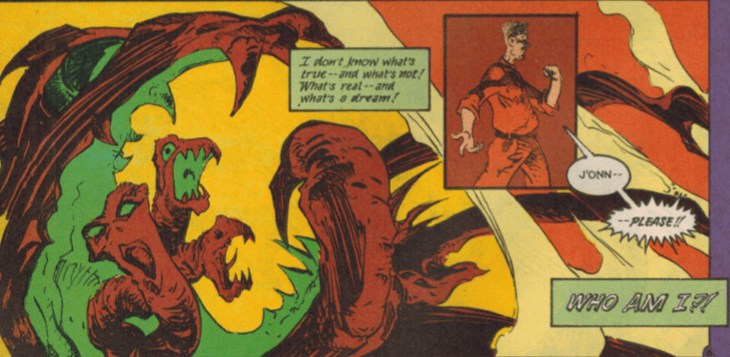
One reason may be because we are now safe and our mind knows it. Past trauma, especially childhood trauma, cannot be handled or understood because of the circumstances of our situations. Whether it be an abusive household that cannot be escaped, or an inability to process what has happened to us, we push it away. We compartmentalize the pain and push it away, creating a façade to hide who we are and how we truly feel. We create an image of ourselves based off how others believe we should look and behave in the same way J’onn became a hero based off Dr. Erdell’s interpretation of what it means to be “Martian”. Dr. Erdell explains: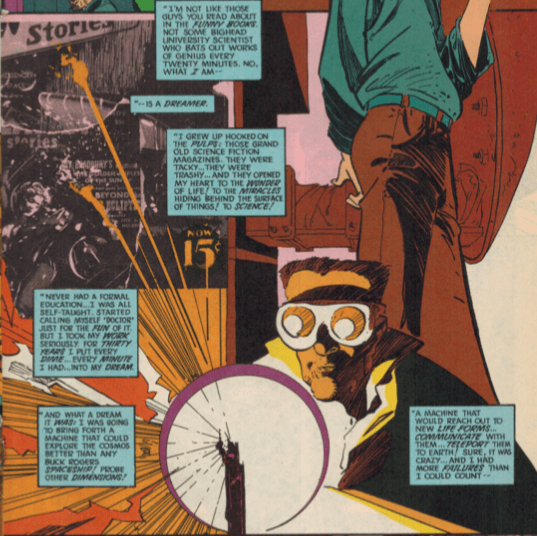
“You couldn’t think. You couldn’t function. And you had to function if you were going to survive here. You needed a mental structure that would allow you to function. The time we’d spent together — your psyche to open to me — had created a bond between us…mind-to-mind. I decided to use that bond to — not exactly fabricate, J’onn. I borrowed bits and pieces from the pulps…created the kind of Martian I knew best…the kind Edgar Rice Burroughs would’ve been proud of… What I did was suggest your new shape. I figured a beetle-browed Martian right out of a ‘50s sci-fi movie would still be an alien– but he’d be an alien that folks would be more comfortable with. He’d fit their concept of what a man from mars should be.”
Like J’onn, we push away the past until we are able to handle the truth. Until then, we dissociate and cope through workaholism, perfectionism, denial, excessive exercise, humor, drugs, alcohol, addiction, and self-harm. We live a life of cognitive distortions until we make the choice to heal, or have no other option. 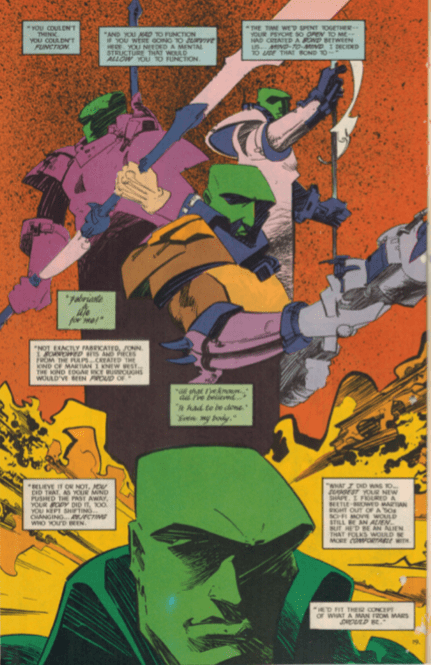
J’on refuses to face his fear of fire until the last possible moment. Until it appears the pain will become unbarable, and we keep a safe distance from our fears through dissociation. 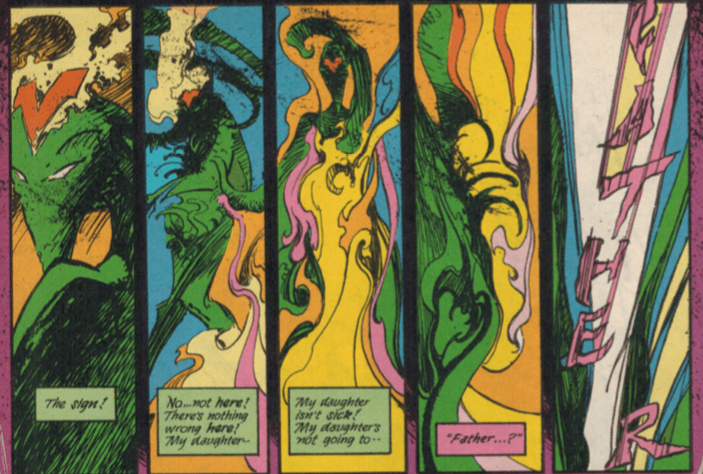
Even when Dr. Erdell calls for J’onn’s help, he cannot move, in the same way those closest to us need us, but we feel trapped inside our own minds attempting to cope with PTSD. 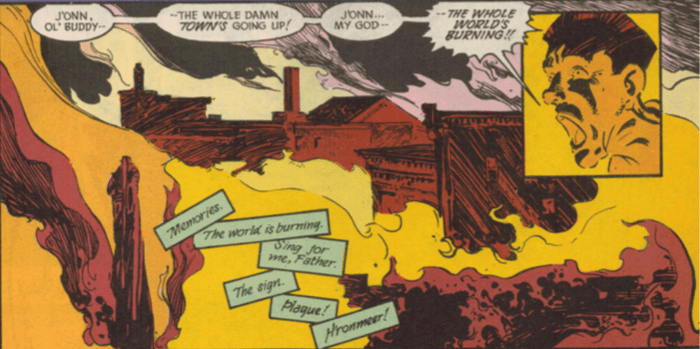
We are paralyzed with fear, hypervigilance, and disbelief until, like J’onn, we collapse under the weight of the past. It is not until then we begin to remember the past trauma and believe it happened.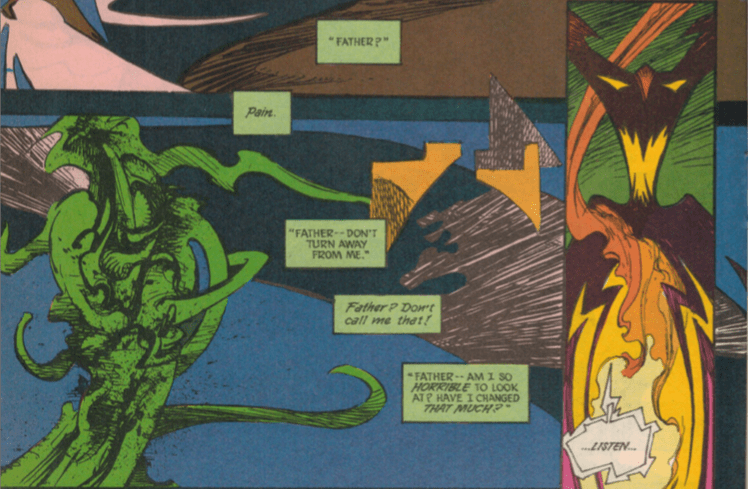
Slowly, we begin to grieve and mourn the way J’onn grieves for the daughter he lost.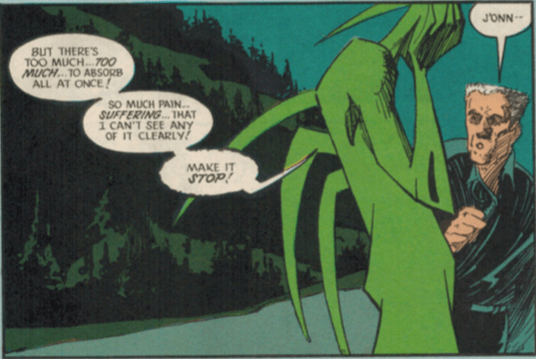
We grow angry as we attempt to piece together the past and come to understand who we were and who we are becoming. How we are transforming into someone new. 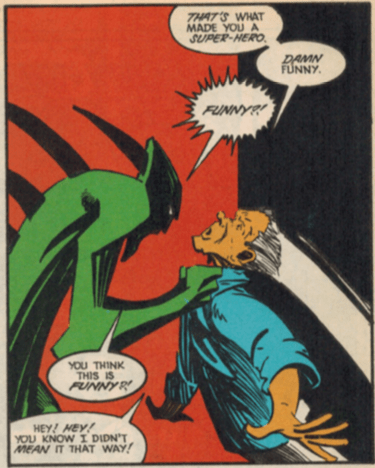
Someone better.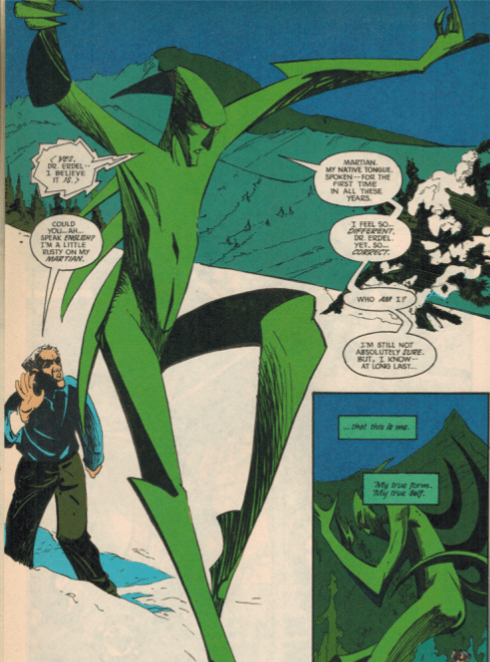
The transformation is hard and difficult, but it is the only way to grow and become who we were meant to be.
J’onn teaches us that the healing process does not happen in a straight line, 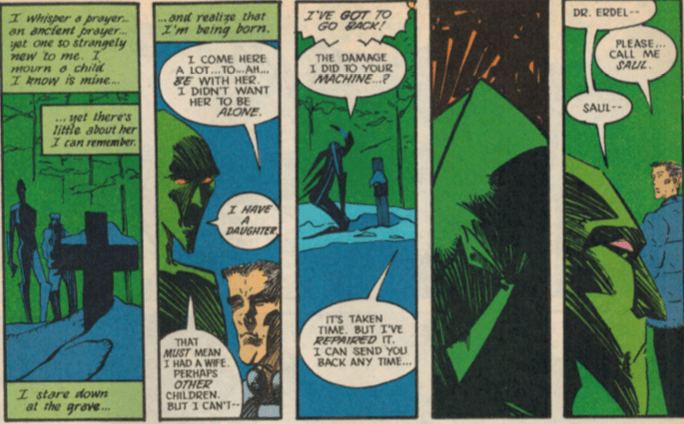
moving from step to step until we reach the end. It is a river with streams that loop in and onto themselves, causing us to return to places we have previously visited, but with new perspective and understanding about the journey ahead. Martian Manhunter shows this when it takes J’onn 2 ½ issues to make the decision to heal. Throughout each scene, J’onn fights the images of the past. He is confused about what in his past is real and what is not. And each battle with the villain appears to be layered with a deep spirituality. It is a journey that is different.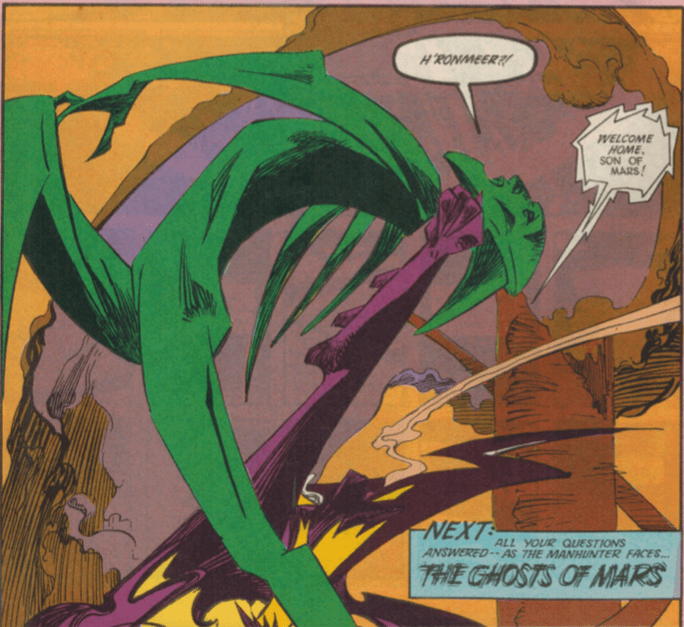
Martian Manhunter: The Healing Process (Part 4)
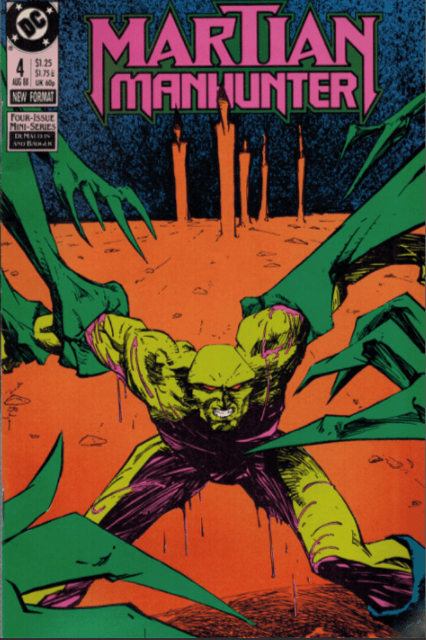
Martian Manhunter#4 teaches us that when a survivor makes a choice to heal, everything about the survivor changes. At the end of issue #3, J’onn realizes the truth of how he arrived on Earth. Believing Dr. Erdell (the scientist who transported J’on from Mars to Earth) was dead, the Martian Manhunter comes to understand that all he believed to be true was a lie. Piecing fragments of memories together, J’on comes to understand his people were not warriors, but poets. 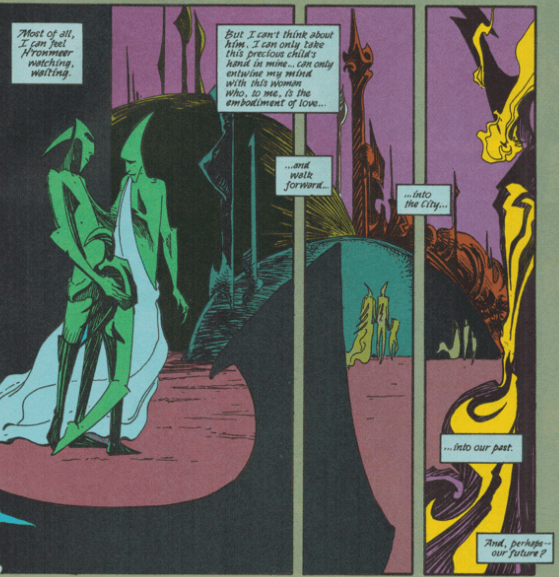
He did not have memories of his father, but memories of himself as the father to his own child who died in his arms. Even his appearance had changed to become more jagged, rather than humanoid.
Similar to J’onn, when we, as survivors of sexual abuse, make the choice to heal and not deny the trauma of our past, memories of the life we lived prior to and during the sexual abuse return. Sometimes they return violently, causing us to question our sanity and strength in the same way J’onn questioned the possibility of a virus causing him to hallucinate and the strength to save ourselves while being present for those we care for. 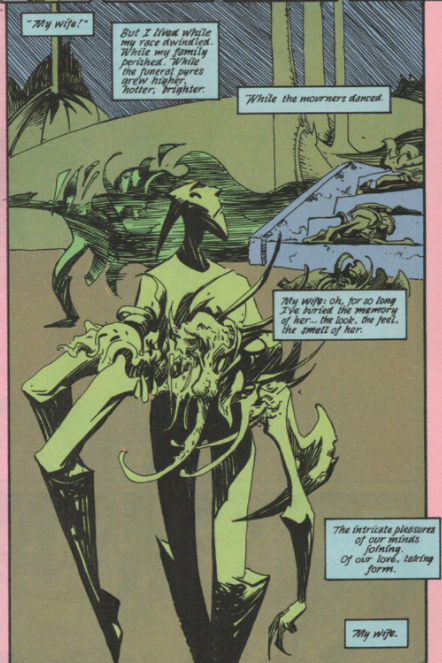
These memories of a person and life may contradict what we believe to be true in the same way J’onn’s memories contradicted what he believed to be true about his people and his past. The reality of the past, impact the present by changing the way we see ourselves and the way others see us in the same way J’onn’s form changed to resemble the appearance of his species.
After we choose to heal we feel a sense of relief.
We say to ourselves, “Thank God, I’m not crazy.” Many times the jubilation may causes us to want to know more and understand it all immediately.
Now! 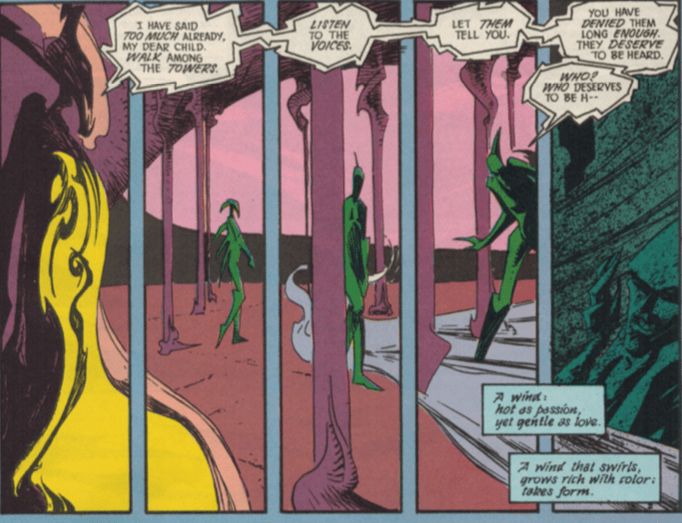
We do not want to wait! We want to become better and we focus all of our energy into knowing the past, practicing mindfulness, and embracing our new identity!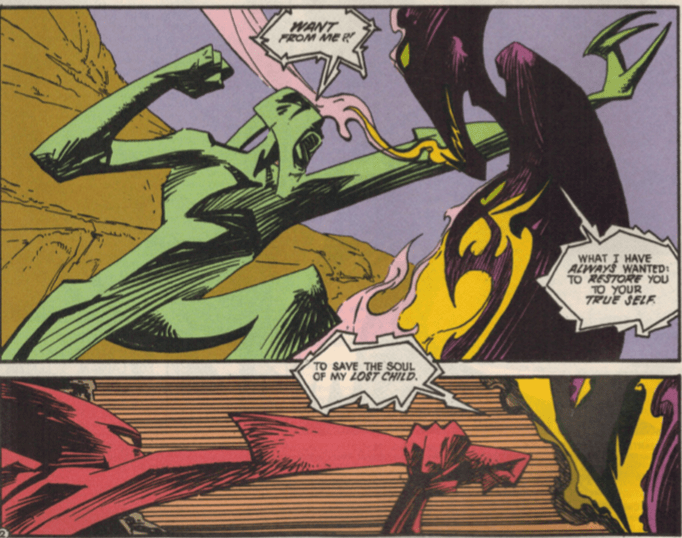
We forget that healing, remembering, growth, and accepting the truth takes time and patience.
We are reminded of this when we stumble and reenter the Emergency Stage, becoming frustrated with ourselves and feeling like a failure. It is for this reason we must know that healing does occur in a bubble.
No matter how much we as survivors may believe and tell ourselves, “I don’t need anyone. I can do this on my own,” support from a partner, family member, therapist, or counselor is needed to heal. J’onn’s support came in the form of Dr. Erdell. The character knew not to be in a hurry to remember the memories. He knew, as trained therapist and counselors know, healing and remembering takes time.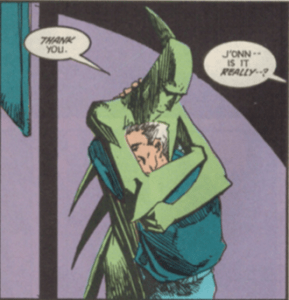
While fragments of memories wavered on the edge of consciousness, he still could not remember everything, so the Martian returned home.
Once transported back to Mars memories of his past return. 
The life he lived, 
the family he loved, 
the tragedy that made him forget, 
and how time allowed him to heal and gain the courage to become stronger. 
Rather than hate himself and view his actions as weak, as he did in the past, J’onn remembers, grows, and becomes complete. 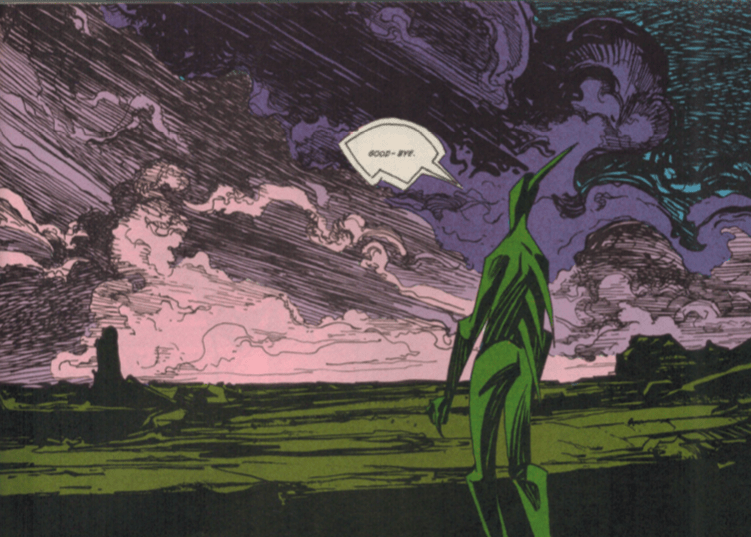
This is what it means to heal from past trauma. 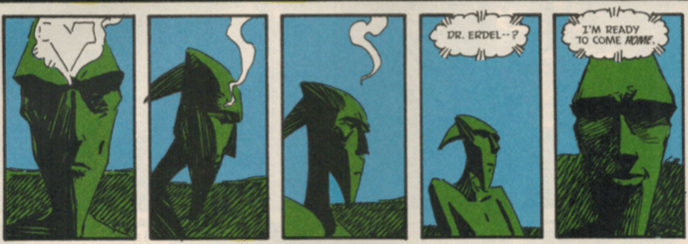
It means accepting the fact that bad things happen, but learning the skills needed to feel safe in our body. 
This is the only way to kill our superhero and become a survivor.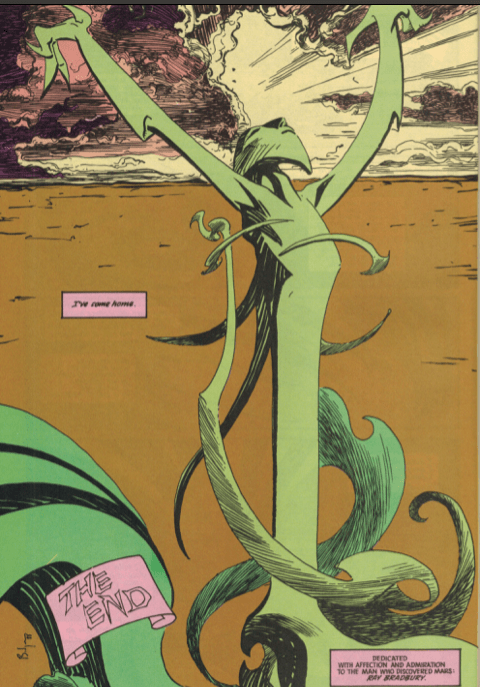
Flash Loses the Speed Force
To alleviate these obstacles, I moved from strictly memoir writing to a self-help format that males can easily relate to in order to make healing possible while also being entertaining and connecting to a character they know and love. Although I know my writing and speaking on a sensitive topic such as childhood sexual abuse has helped many other survivors to begin the process of recovery, my thoughts can sometimes become negative. As a male survivor myself, staying positive while also practicing self-care is a full-time job on top of my other full-time jobs. So, believing that I am making any difference as book sales stagnate, good hearted celebrities continuously spout the belief that men and boys cannot be raped, and online advertisement comments for my books consist of jokes about my name or the how “hypervigilance is a good thing” rather than healing to become a complete person, was becoming difficult. I began to question whether or not men want to heal at all, or do they just want to remain bruised and broken, pushing those they care about further and further away. I know this is not true, but I could not find a more valid answer to the growth and perpetuation of toxic masculinity throughout our society until this morning.
While sitting in my daughter’s room reading Flash #41: “The Perfect Storm: Part Three” (2018) as she put together a Paw Patrol puzzle, something Barry said made clicked. In this six-part series, Grodd has stripped Barry of his connection to the Speed Force, taking his title as Flash in the process. However, before stripping Barry of his superpowers, Gordd says to Barry in Flash #40 by projecting thoughts into the hero’s mind:
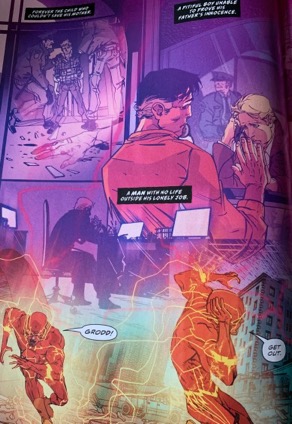
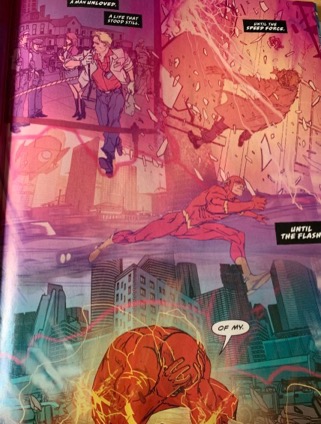
Your mind moves so fast that controlling you is a challenge, Flash. But I can still gaze deep into your mind. To your darkest secret. The one that you keep from your family and friends! Who you really are. Forever the child who couldn’t save his mother. A pitiful boy unable to prove his father’s innocence. A man with no life outside his lonely job. A man unloved. A life that stood still. Until the Speed Force. Until the Flash! You had friends. You caught your mother’s killer. You proved your father’s innocence. You had it all. It’s what made you special. You hide and protect your powers. The Speed Force gave you the life you always wanted. Because you know in your heart that without them you would be nothing.
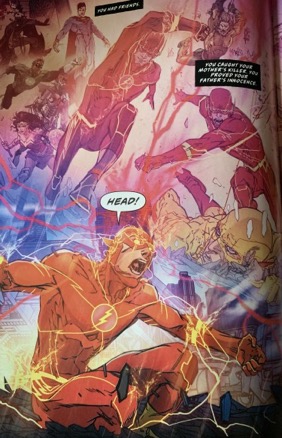
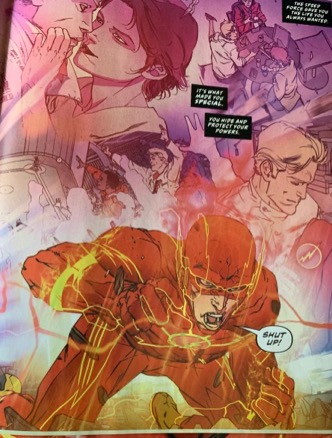
Later, without his powers, and on his way to release the villain, Godspeed from the prison Iron Heights, in the hope that he can help restore his powers using a lighting wand, Barry thinks to himself:
Wally didn’t know me until after I was the Flash. No one did. And I don’t want him to ever meet that version of me. The one from before the powers. Every time I’ve had to break into Iron Heights I’ve hated it. But I’m desperate. Without my powers, I’m just as broken as the wand.
After reading these lines, I began to think of Judith Lewis Herman, M.D.’s book Trauma and Recoveryand what she says healing truly means. She explains that once an individual moves down the path of recovery, “the survivor must be ready to relinquish the ‘specialness’ of her identity.” Herman goes on to explain:
Commonality with other people carries with it all the meanings of the word common.It means belonging to a society, having a public role, being part of that which is universal. It means have a feeling of familiarity, of being known, of communion. It means taking part in the customary, the commonplace, the ordinary, and the everyday. It also carries with it a feeling of smallness, of insignificance, a sense that one’s own troubles are “as a drop of rain in the sea.” The survivor who has achieved commonality with others can rest from her labors. Her recovery is accomplished. All that remains before her is her life.
What Judith Herman is explaining in these lines is that survivors who continue to heal and recover from past trauma eventually realize that they are not alone in their trauma. Through interactions, and a rejoining of society they see that so many others have been hurt in similar ways, if not worse. Coming to this realization means no longer feeling the strength associated with believing they are unique, special, or different, but the same as everyone else.
Please, don’t misunderstand what I am attempting to explain. I am not saying that the trauma of sexual abuse and assault is viewed as a good thing in the mind of a survivor. What I am saying is that when an individual suffers the trauma of being sexually abused their power is taken away. They feel weak, and no longer in control of their life, body, or thoughts. However, over time a survivor may come to believe that their sexual abuse, assault, or trauma, is the only thing that makes them special. While the sexual abuse / assault stripped them of their power, overtime that same sexual abuse / assault makes a survivor feel entitled to think, behave, and act in ways that are hurtful to themselves and others. The trauma becomes a source of power for the survivor, but in a negative way. Sort of like the Negative Speed Force. This way of thinking transforms the thoughts of a survivor to those of a victim and can be seen in the thoughts and actions of Barry.
Barry never truly healed from his childhood trauma. Instead, he was bestowed with the power of the Speed Force, making him the Flash. Before his abilities, he believed he was worthless. After receiving his abilities, these thoughts did not go away. They remained locked deep within his mind, making him believe that without his connection to the Speed Force, he will lose the life he has built. So, after losing his powers to Grodd, Barry felt as if he were nothing, quickly performing actions that resembles those of a villain in order to regain his feelings of being “unique” by becoming Flash once again.
In many cases, male survivors who do not want to heal from the trauma of their childhood sexual abuse believe that if they do, they will lose what makes them “unique”. They believe they will lose their “special abilities” that saved them as a “hypervigilant” child. They believe that without the skills they developed as a result of their childhood trauma they are nothing, and everyone will see how worthless they are. This is not true for Barry Allen, or other male survivors who are afraid to heal. Just as Barry’s connection to the Speed Force is not what makes him a hero, a survivor’s trauma is not the sum of their worth. Barry still had a loving father, and worked to become a great CSI detective for Central City. His abilities are also not what made others view him as a friend, leader, and lover. As a male survivor, the people closest to you do not love you for your ability to remain hypervigilant, or seek perfectionism throughout all aspects of your life. They love and care for you, for who are.
Choosing to heal is a difficult decision that requires a lot of work, bravery, and courage. Those of you who choose to make this choice are not choosing to become weak. Instead, you are choosing to develop abilities you never knew you had to become stronger than you ever imagined possible. Do not be afraid. If you chose to heal you are still a “real” man. The only difference is that now you’re also becoming a “better” man.
Your Ability to Cope With Trauma
PRE-EVENT FACTORS
Some factors that influence whether or not a person develops PTSD is their exposure to pre-event factors. Unfortunately, it is the exposure of pre-event factors that has the potential to create Complex-PTSD (C-PTSD). C-PTSD is a form of type II PTSD where symptoms occurred early in life, were prolonged, and interpersonal. While childhood sexual abuse qualifies as possibly resulting in C-PTSD there are other factors which contribute:
- previous exposure to severe adverse life events or trauma or childhood victimization, including neglect, emotional abuse, sexual abuse, physical abuse, or witnessing abuse
- family instability, including a history of parental psychiatric disorder, numerous childhood separations, economic problems, or family violence
- trouble with authority, even in childhood, including running away from home, school suspension, academic underachievement, delinquency, fighting, or truancy
- absence of social support to help out in bad times
- multiple early losses of people, possessions, or home
HEROES AND VILLAINS WITH C-PTSD
You may notice that many of the superheroes we love fall into many, if not all, of these pre-event factors. For example, the loss of Bruce Wayne’s parents resulted in an absence of social support to help in bad times. Clark Kent / Kal-El loss of his parents with the destruction of his planet, Krytpon, created a feeling of childhood separation with the loss of his family of origin. Finally, Barry Allen’s loss his mother and father created multiple loses early in his life. The list of characters continue in the Marvel universe with the death of Peter Parker’s parents, the domestic abuse and eventually murder of Bruce Banner’s mother by his father, and the absence of Matt Murdock’s mother before, during, and after losing his sight.
What’s also interesting is that many villains we may see ourselves as also suffer from C-PTSD. Bane grew up in a pit that filled with water each day with no one to care for him creating a sever life experience. Lex-Luthor’s father was a drunk and abusive forcing the young boy to run away on more than one occasion. Finally, while intelligent, Leonard Snark, came from an abusive household resulting in fighting and delinquency. In the Marvel universe Victor von Doom was targeted and hunted with the rest of his family, and Harry Osbourn’s father, Norman Osbourn, was verbally abusive and emotional absent.
The primary difference that separates one from the other is the ability to develop resilience from the impact of trauma. What is similar between the two groups is that both heroes and villains struggle to come to terms and heal from their C-PTSD. To move from identifying as either hero or villain, you must progress down the path of healing to become a survivor.
EXERCISE: MY ABILITY TO COPE WITH TRAUMA
In The PTSD Workbookan exercise I recently completed helped me to understand where I was in my ability to heal from the trauma of my childhood sexual abuse. I have been working to recover from the trauma of my childhood sexual abuse for over five years with the help of a therapist, psychiatrist, medication, and meditation so I may be a little further along than many other survivors. Even with that being said, I still struggle with depression, anxiety, shame, and grief daily. This exercise below may help you the same way it helped me.
Directions:Check those of the following statements that you believe apply to you.
- ______ I have a high degree of extraversion (I like to be with people).
- ______ I am open to new experiences.
- ______ I am conscientious in the work I do (I follow through).
- ______ I am an agree able person.
- ______ I believe that my source of personal power lies within me.
- ______ I am confident in my own abilities to cope with situations.
- ______ I try to find meaning in what happens to me.
- ______ I try to break down bad situations into manageable parts I can handle.
- ______ I am motivated to solve the problems that occur in my life.
- ______ I am generally an optimistic person – I see things more positively than
- ______ I take control in situations whenever possible, or at least try to take
- ______ I like a good challenge, and I rise to the occasion.
- ______ I am committed to overcoming the bad things I have experienced in life.
- ______ I have a good social support network – there are people I can turn to.
- ______ I understand my life’s circumstances and what I can and cannot do about
- ______ I have faith.
- ______ I have a sense of humor.
- ______ I have a sense of hope.
- ______ I like to try new things or look at things in new ways.
- ______ I am open to how others feel.
- ______ I am an action-oriented person – I would rather do something than sit back and let it be done to me.
- ______ I actively try to structure my life and make plans.
Observations
- How many items did you check? Do you notice any pattern of those you did or did not check?
- What do you observe about yourself from reading these statements?
The more you checked, the more likely you are to take action and to work through the trauma that happened to you. However, if you have not checked many it does not mean that you are not deserving of healing. Everyone, no matter of their past, deserves to heal from their childhood trauma to become a complete person.
What I Observe:
- I checked 11 of the 22 questions. What I noticed about the questions I did not check is that I still have a problem with spontaneity. I do not like to try things I cannot control because it scares me and results in a feeling of insecurity and shame from being sexually abused as a child. It also makes me feel worthless and suicidal thoughts.
- I observe that I although I have come a long way, I still am in recovery.
*If you enjoy this exercise it can be found in The PTSD Workbook: Third Edition(2016).
Streamofconsciousness
Why Only Write for Male Survivors
I am not a psychiatrist, therapist, or counselor for trauma or sexual abuse. I am a male survivor of childhood sexual abuse. This means, for now, I am only comfortable writing about the trauma I know and have experienced. It is a trauma I have suffered and continue to recover from. This book is an extension of my recovery. It is an attempt to help other male survivors while understanding the effects my sexual abuse has had throughout all aspects of my life. It is a refusal to remain silent while providing a voice for myself and other survivors who feel they must remain silent.
This book is written specifically for male survivors because male survivors of sexual abuse are often ignored and made to believe they do not exist. Writing specifically for male survivors helps to foster a safe community for male survivors. Creating this community allows awareness of male survivors to be recognized throughout society.
To ensure healing for male survivors the community must take an active role in acknowledging the survivor’s abuse, and that it did occur. This cannot be done in the shadows. While the “Me Too” movement has begun to shed light on the sexual assault, abuse, and rape of women, much more still has to be done to provide the needed support for female survivors. Although this is true, there are even fewer supports available for male survivors. Without the same light being shown on the sexual abuse of boys and men, male survivors continue to feel shame humiliation, and guilty for an abuse they had no control over. Without an recognition and restitution by the community in which we live, male survivors will never be given the opportunity to heal.
In their article “Rape Trauma Syndrome”, Burges and Holmstrom found that women who made the best recovers were those who had become advocates of the antirape movement, so why shouldn’t the same be assumed to be true for male survivors? Unfortunately, male survivors feel as if they must continue to hide and that the only individuals who have suffered this trauma, forcing them to feel weak and victimized throughout their lives. Soldiers and survivors of war have living monuments they can visit to express their grief, loss, and trauma while survivors of sexual assault and of sexual assault and abuse suffer their abuse without the possibility to living anchor to tether their trauma. Judith Herman explains that, “in refusing to hide or be silenced, in insisting that rape is a pubic matter, and in demanding social change, survivors create their own living monument.” This book, and others like it, are my attempt to not be silenced and create a living anchor for male survivors.
Becoming a Villain
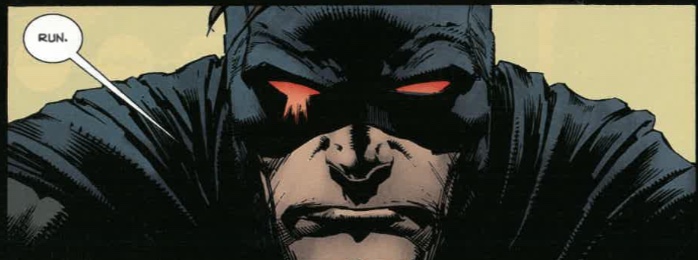
“Every villain is a hero in his own mind.” Tom Hiddleston
“You either die a hero, or live long enough to see yourself become the villain.” Harvey Dent The Dark Knight
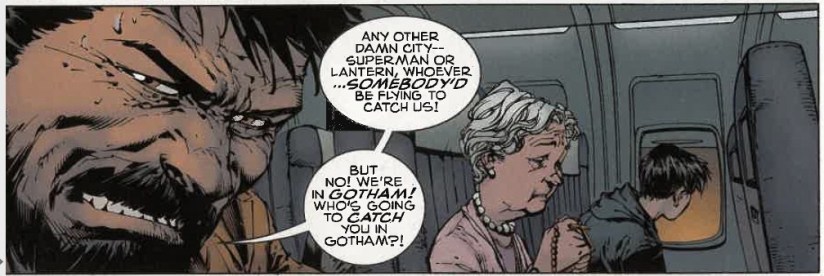
It was summer, and the dash cam video of Philando Castille being shot by a police officer had just been released. Earlier that day, I replayed the video over, and over, and over again, analyzing the words between the officer and Philando, the legitimate fear in the officer’s voice, and the shots as they discharged from the officer’s gun to enter the open window of the young black man to take his life. Although angering and confusing, what struck me the most was the back door of the car opening moments later, and Philando’s daughter stepping out onto the sidewalk to enter the arms of the police officer’s partner. I watched her to notice any signs of tears, fear, or trauma as she left the car. Instead, I saw a young girl who did not run from the back seat of a car that had just been shot into, but opened the door calmly and entered a world in which her father was no longer present.
So many thoughts ran through my head eat time I replayed the footage. I thought, “That could be me,”and, “What would happen to Mirus and Amare if that were to happen to me? Would they cry? Would they know what had just happened?”
That night, I sat on the deck of my home and drank. Sarah came out to join me after putting the girls to sleep. She wanted to know how I was feeling, and as usually, talking about my feelings is harder than knocking out a rotten tooth with an ice skate with a coconut on a deserted island with a dilapidated volleyball named Wilson watching in the corner. Instead of confiding in my wife, I pushed her away. In fact, I did worse than that.
The night drifted with the twinkle of lightning bugs and the sound of drunken conversation from the busy streets of Baltimore. The nuances that began the conversation escape me, but I do remember her saying, “That’s interesting because you said I was ‘your rock’ in the video attached to your interview.”
Zero beats pass when I say, “I lied on that interview. You’re not my rock. I don’t trust you. I don’t trust anyone. I barely trust myself.”
Many beats pass as I take a large gulp of whiskey and coke, hoping for it to heal my viral heart infection and the hollow feeling deep in the pit of my stomach. Finally, she says, with tears in her eyes, “That may be the most hurtful thing you have ever said to me.”
This is where I turned the corner from bad guy and became the villain of my own story.
“Fuck your feelings!” I say loud and with anger.
I say these words over and over again as I rant, and scream, and become angrier with each passing moment thinking of that girl leaving the back seat of that car and the injustices of the world that would leave me with a viral heart infection and my principal in power after saying I cannot say I am survivor of childhood sexual abuse on school grounds. Sarah tells me to calm down and stop yelling, but it only makes me more angry. I continue to yell so much that the neighbor opens her back door to make sure everything is okay, but I don’t care.
Soon, Sarah’s tears are gone. She does not yell back. She does not scream. She does not walk away. She sits there, on the deck, and lets me be angry.
Five minutes turned fifteen and soon to thirty. Afterward, my whiskey and my anger are gone. There is only a thin residue lining my glass and heart. Sarah, says one thing before going into the house to check on our children.
“If you ever question how much I love you, know that I just let you yell and embarrass me in front of our neighbors for over a half an hour.”
I have had some horrific things happen in my past. I have been homeless, sexually assaulted, suffered from a deep depression that left me physically sick and wishing to commit suicide, but I have never wished to travel back in time and change any of them. Each of them, no matter how painful, made me who I am today, for better or worse. All of them except this one. I wish that night had never happened and those words had never left my mouth.
Becoming a villain does not happen overnight. The process is slow, like shifting from one moment to the next until the calendar marks the passing of yet another year without growing wiser. Life’s traumas and tragedies, like water, attack slow and steady, wearing away the civility of heroism and justice. If you let it, all it leaves behind is anger, manifesting its self into hatred attacking those closes to use because they are the easiest prey. They are the ones we reveal our most intimate selves to, so why not hurt them the most.
Like Gotham, I was hurting that night. The viral heart infection had taken away my health, a petite white woman in the form of a principal had stripped my power as male survivor by attempting to keep me silent, the world’s therapist and psychiatrist seemed to not want Heroes, Villains, and Healingas a source for male survivors of childhood sexual abuse with each blocked email address, and I felt more alone than ever as a sexually abused educated black male in a society that refused to follow the rules of good and evil.
I was Gotham.
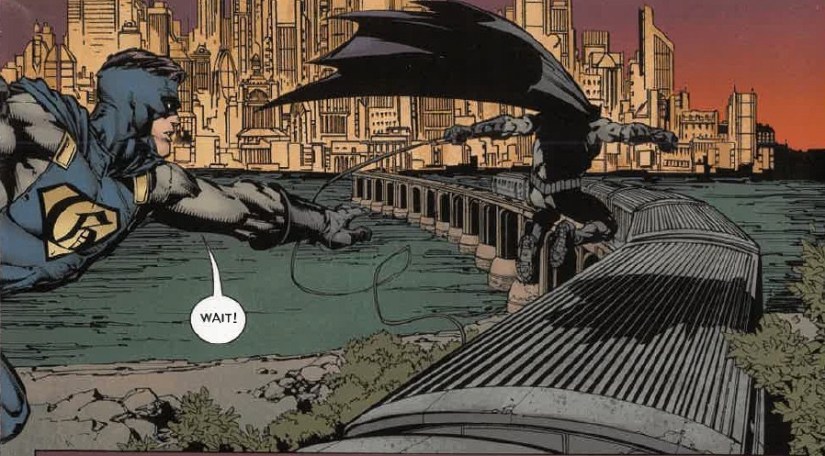
I was the villain.
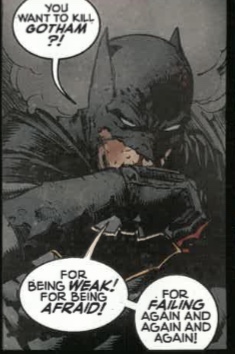
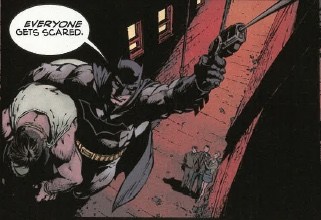
There was no Batman to blame. No Batman to kill. There was only me, hurting the woman I loved because I was in pain.
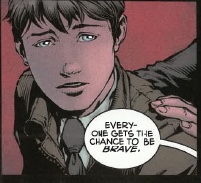
And that woman saved me.
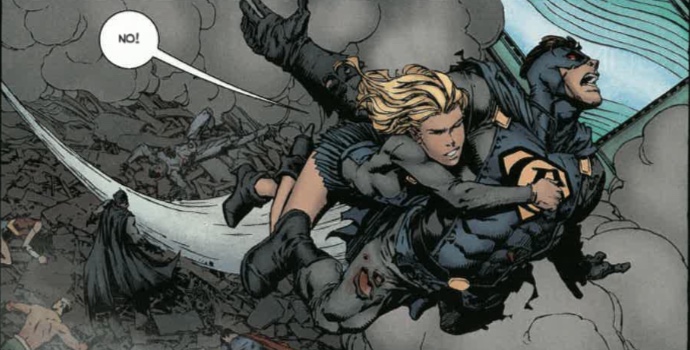
As a survivor, my victimization does not allow me the freedom of perpetuating fear, anger, and hatred toward those around me, no matter who they may be, or how I may be feeling. It leads to becoming a villain / perpetrator / abuser.
It’s been over a year, but I still apologize for that night. Each time she tells me, she is happy that it happened. She saw a side of me I often keep hidden. I often smile, laugh, and attempt to make everyone happy, but she never sees me angry. She was happy to see my humanity and be there when I needed her. I’m sorry she was and I will continue to apologize. Too often women feel as though they have to be the punching bag (emotional and physical) for the men they love. It is not right and must change. I never want Sarah to have to feel that way toward me.
I’m filled with embarrassment and shame over that night.
Each day I try and make it up to her because she is my rock. She’s the strongest person I know and will ever know. Each day I strive to become the hero I wish her to see me as being. I only hope I have her courage.
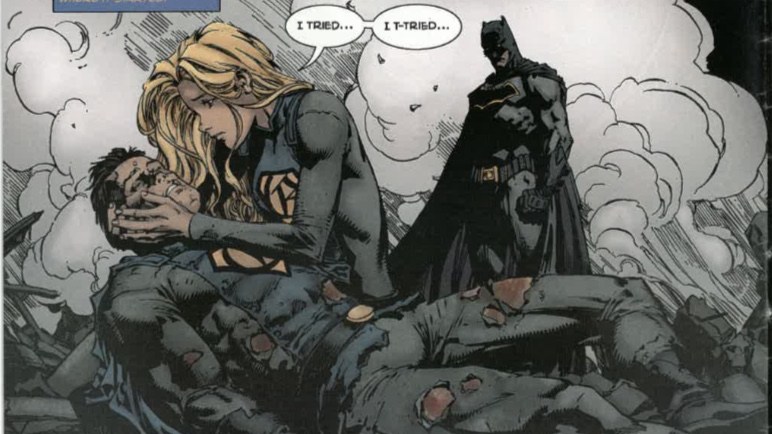
Dark Knight Rises
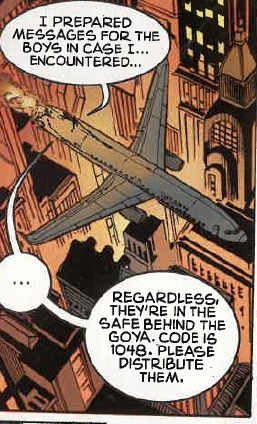
What I truly meant was, “I can fix me.”
So, I used the tools in my arsenal in an attempt to help myself feel better. I went to the gym, meditated, listened to calming music, went to my therapist (six hours away), went to my psychiatrist (also six hours away), slept, talked with my wife about my feelings (as best I could), and stayed on top of taking my medication. Unfortunately, none of these strategies worked as well as I would have liked.
One day, near the end of the school day last week, my chest began to hurt and my left arm became heavy. Sitting at my desk I thought to myself, “No! Not again! I can fix this! I don’t need to go to the hospital! I don’t have the time to go to the hospital! I can fix this!” So, I took some ibuprofen (prescribed by my doctor), waited, and the pain went away. I told my therapist and she said the same thing you’re thinking, “You have to go to the hospital. You can’t fix this alone.” I agreed, but I still have not gone because of fear, stubbornness, and the fact that I’ve been more times then I care to mention regarding of my heart.
You see, two years ago the same incident described above happened. I sat at my desk in my classroom in Baltimore grading papers when my chest began to hurt. I thought it was just another of my many panic attacks. Soon my left arm went heavy and numb with a pain that’s difficult to describe. I could feel my heartrate increase dramatically and I knew something was not right. I went to the school nurse and soon I found myself in an ambulance on my way to hospital to be treated for a viral heart infection. For two months I went through test after test to understand what, if anything was wrong with my heart. I did not enter my classroom, I did not work out, and I could barely move for two months. It’s during that two months I wrote a large part of Heroes, Villains, and Healingas quickly as I could out of fear that if I might die and other male survivors would not have the resources needed to heal.
As a male survivor, many times I feel the need to control as much as possible. This is because, as a survivor, my control and power were taken away from me when I was sexually assaulted at eight-years-old. This is not only true for survivors of sexual assault, but many individuals who have suffered trauma or suffer from PTSD. Lack of control means lack of power, making the survivor feel as they did when they were sexually assaulted. Hence why Batman attempts to control and plan for all situations. He does not want to feel like that weak little boy on the sidewalk as his parents died.
I have been told these facts by my therapist for years. I have read them in books, and even written about them myself in Heroes, Villains, and Healing, and Raped Black Male. However, no matter how much I know about the science of the brain and the impact trauma has on the body, I still believe and say to myself, “I can fix this!” because that’s what men do, right? We fix things. We identify the problem, form a solution, and get to work. It’s what we’re told to do as boys to become a part of our hardware as adult men. Add the extra layer of trauma and the belief that men are not supposed to talk about their feelings, you create anger,

fear,
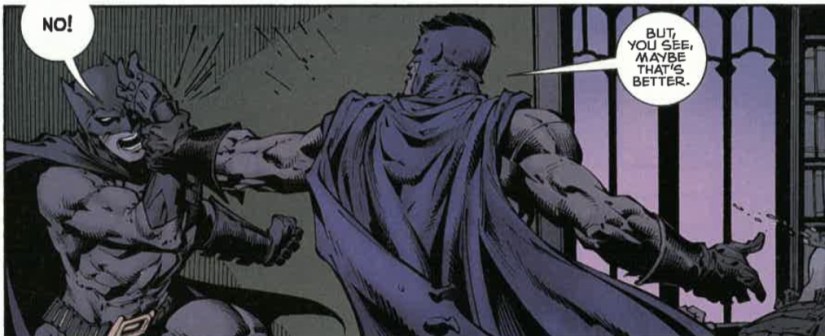
panic,
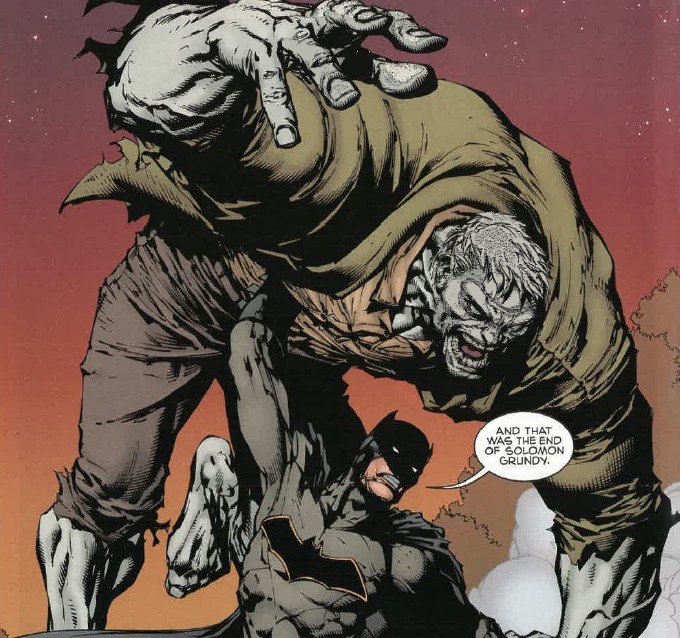
anxiety,
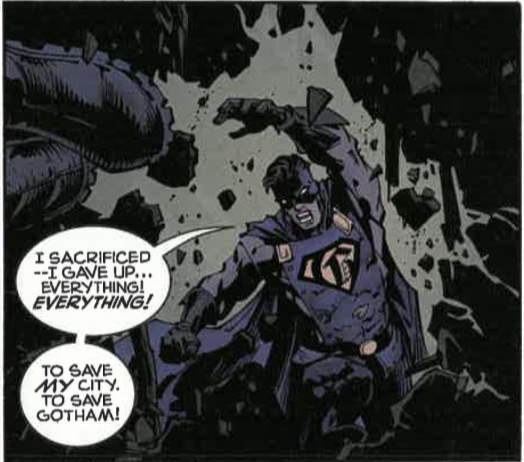
perpetuation of abuse,
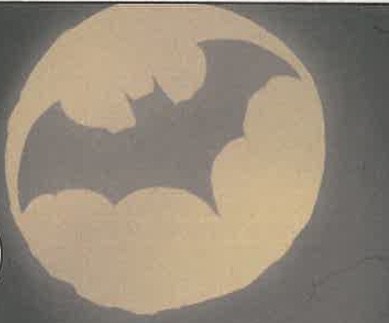
domestic violence,
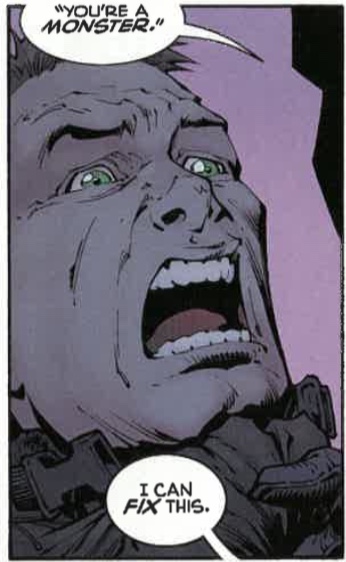
gun violence,
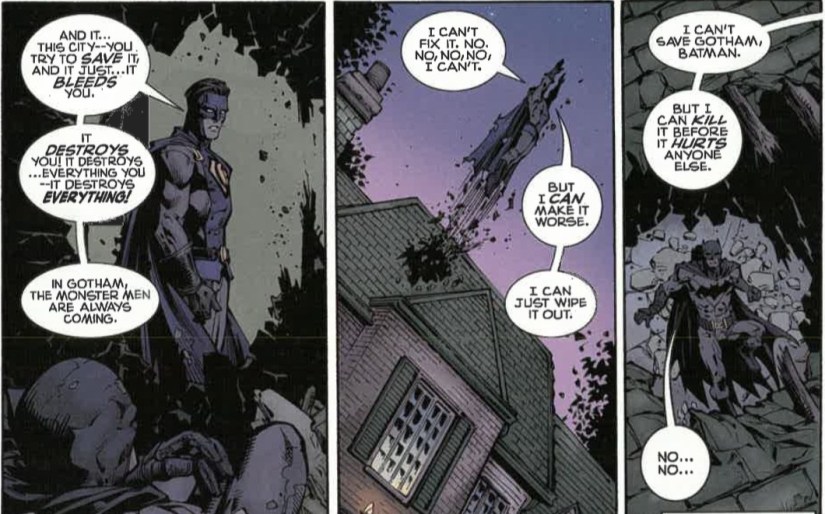
and suicide.
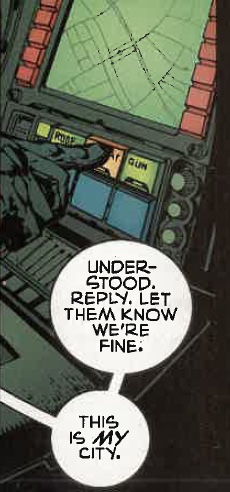
When male survivors think to themselves, “I can fix this!” they are thinking, “I can fix me!” without help. I can pull myself up by my own bootstraps because that’s what “real men” do.
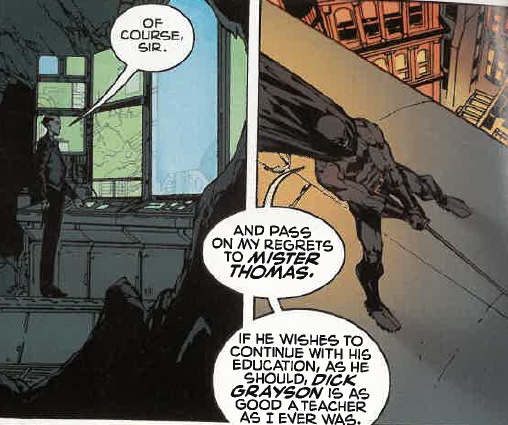
I thought the viral heart infection would teach me differently. I didn’t truly learn the lesson that some things can’t be fixed until my son, Casus, passed away last August and I nearly lost my wife, Sarah. There were complications with the pregnancy as blood clots formed and attempted to pass. Unfortunately, we lost Cas just as we entered the second trimester. Up until the last moment I believed, “I can fix this.” I thought these same words as my mother cried in my arms when I was in high school and she received the news our home was being foreclosed. I thought these words as a child as my parents screamed at one another late into the night. I believed when the doctors entered the hospital to tell my wife the likelihood of Cas making it was very slim, that I had fixed my life so I could fix this too. I looked Sarah’s eyes and told her we would be fine. We can fix this. We’re strong. We can control this. It wasn’t until she was wheeled away and I was left standing in a bathroom of blood that I knew beyond the shadow of a doubt there was nothing I could do to fix this. I was helpless as our son was born prematurely and died in our arms, my wife was given two blood transfers to save her life, and we signed the paperwork to have him cremated.
I miss Cas. I wear a necklace with the names of him and his two sisters to give my strength when times are hard and I need a reminder of the man I was, the man I have become, and why I’m still breathing. Although I miss my son, he gave me a gift when he passed. With the passing of Cas came the wisdom that horrific things happen and sometimes, there is nothing we can do to stop them. They cannot be fix, no matter how hard we try, and these bad things are not our fault. They are no one’s fault. Sometimes, bad things happen to good people. This does mean finding something to hate to fill the void of the pain you may feel, but know that it was not your fault.
I now know (most days) that my sexual abuse as a child was not my fault. Bad things happen that are sometimes beyond our control. I was weak then, but that does not mean I am weak now. Many times throughout the week I remind myself of this lesson as my Dark Knight rises and takes a hold of my consciousness, refusing to let go. There are some things that cannot be fixed, but and there are some things can be fixed if we ask for help. You are not alone, so don’t try and recover alone. Find a way to know and understand it was not your fault.
fear
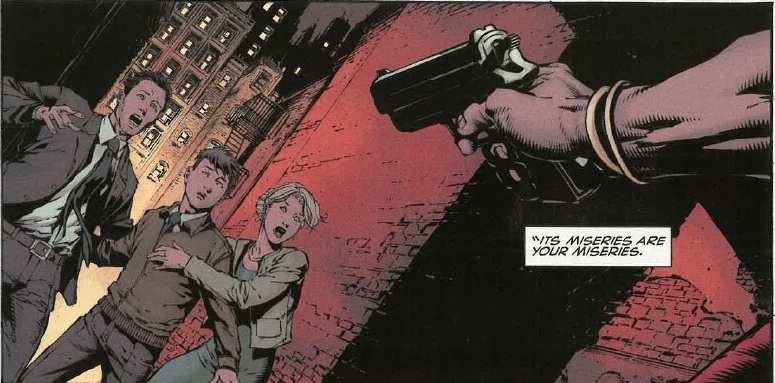
the smell and the weight.
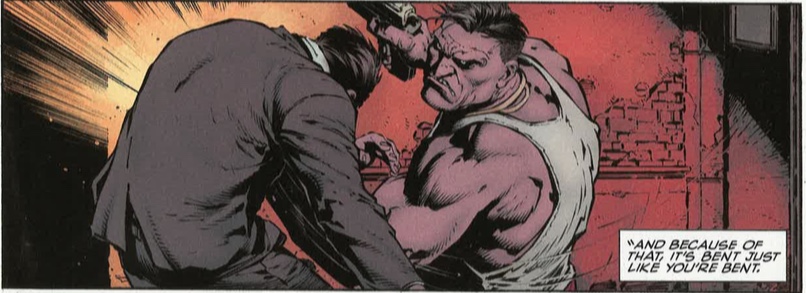
Afterward, came the fear.

So many fears that began with the dark and being alone.
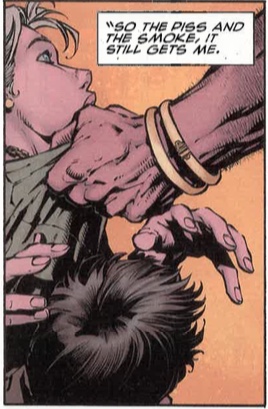
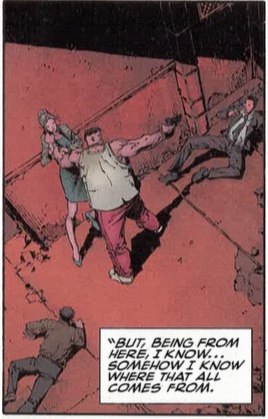
I remember standing outside the locked doors of family bedrooms pounding to be let in only to return to my bed and cry myself to sleep.
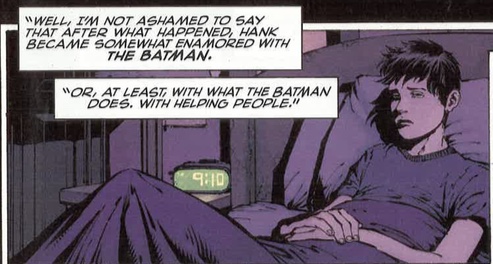
Then, Batman was born.
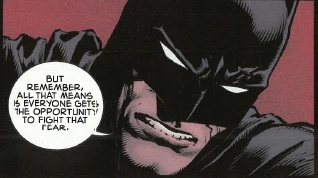
Batman:It’s okay. You can do this alone. You don’t need them. You don’t need anyone except me.

There was the fear of not being good enough that manifested its self in so many ways. Stupidity came with the knowledge that everyone could see my idiocrasy. There was no hiding it. Soon I knew, beyond a doubt, I was going to Hell and there was no place for me in heaven. Like a train roaring over a cliff in an abyss of smoke and smiles one thought led to others as I continued to try and prove to myself that I wasn’t worthless.
Batman:You are worthless, but I can teach you to hide it.

Batman saved me.
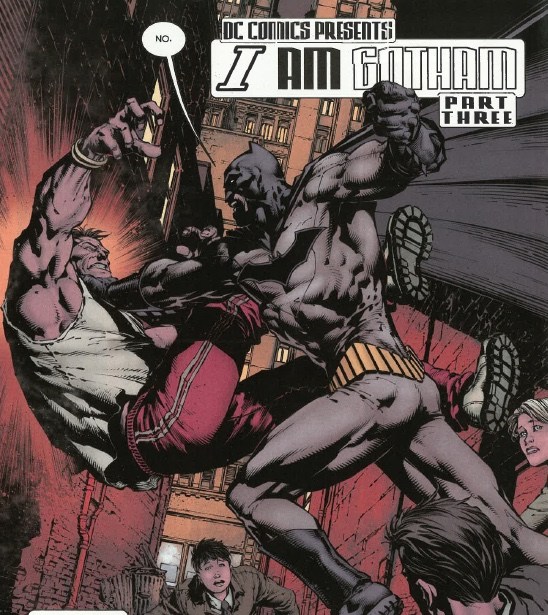
Random Citizen: Hey Kenny, what classes are you taking this semester? Honors? You’re too smart for me.
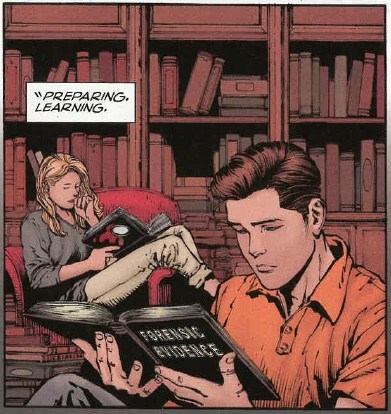
Batman: Except for basic algebra you fucking idiot! Why can’t you be as smart as your friends?
Random Citizen: Congratulations Kenny, you made it to state in speech and debate!
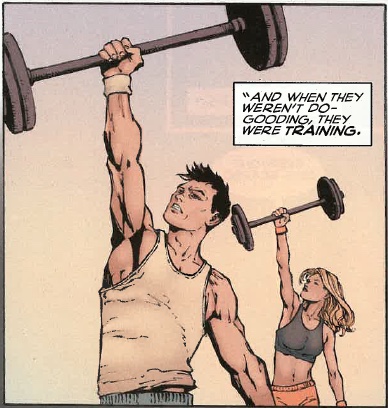
Batman: You didn’t win every tournament! Why didn’t you win every tournament! What are you doing wrong? Fix it!
Random Citizen:Student council, speech, cross country, track, drama, AP English, AP Calculus, band, Key Club, Foreign Language Honors Society, afterschool job, before school paper route. What extracurricular aren’t you involved in? What don’t you do?
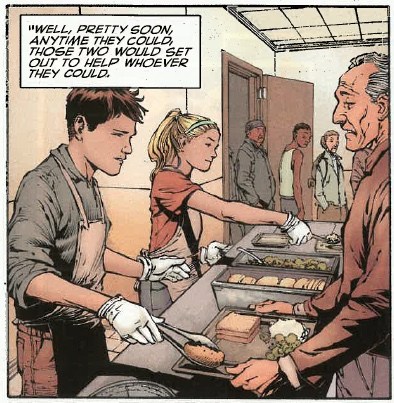
Batman: Wake the fuck up! You don’t have to sleep. You have a test tomorrow in biology and lines to memorize for the school play. I’m not even going to mention the C you got in AP Calculus last quarter. If you want to be more than another stupid nigger then you will get up, deliver those newspapers, and reread the chapter before going to school.
Random Citizen: Full ride to Bowling Green! Wow! Congrats! You are most definitely most likely to succeed!
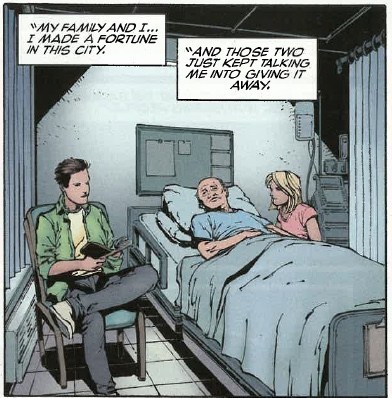
Batman: This is your only way out! You have to do better! You have to do more! Unless you want to stay homeless in Peoria for the rest of your life. Get your shit together because no one else is going to do it for you! The race isn’t over! It’s just started!
Random Citizen: How many books publish and a master’s from JHU? Wow! That’s impressive!
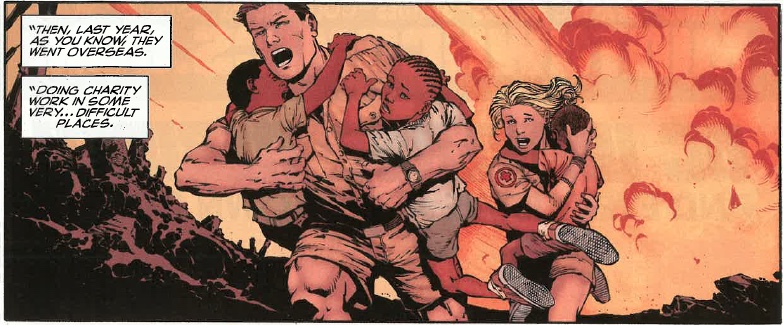
Batman: Not enough! More!
Random Citizen: You’re a great teacher Mr. Rogers!
Batman: You’re terrified of them? For what? They’re only children!
Me: They remind me of…me…and the time…
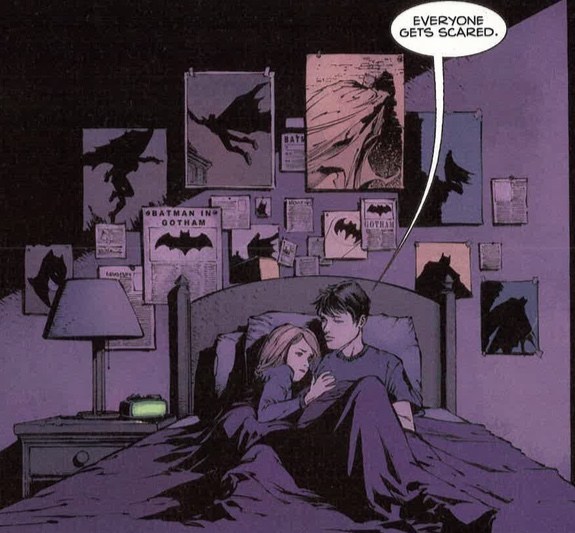
Batman: Stop whining you pussy! They need you more than you and your irrational fear! Get over it!
Random Citizen: You’re going to make a great father!
Batman: Careful. One wrong move and they’ll end up just as damaged and worthless as you.
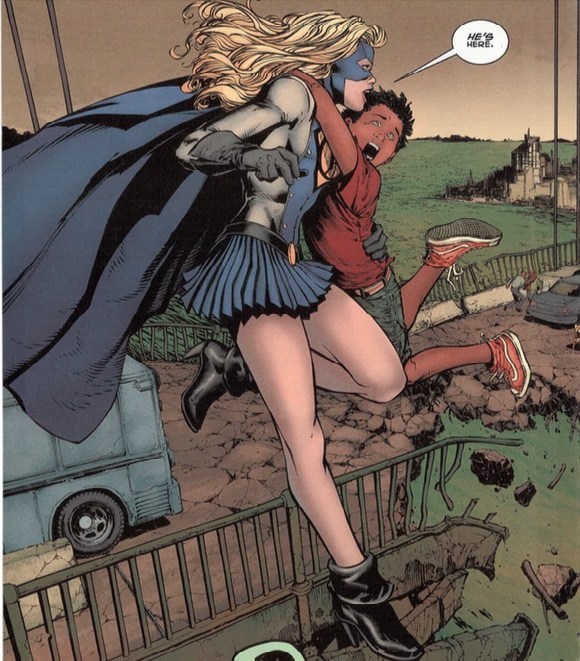
Random Citizen: Career, family, house, you’ve made it Kenny!
Me: I can’t feel anything.
Batman: Good! Now you’re learning!
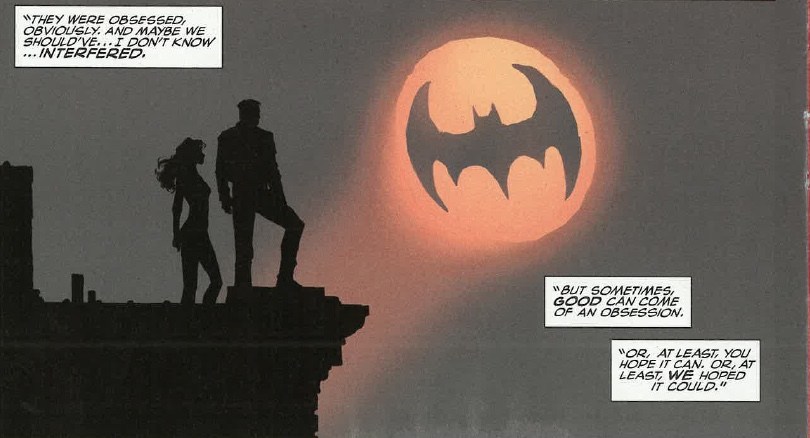
Somehow, in my mind, I always came up short. The world seemed to always be on my back and the weight continued to grow.
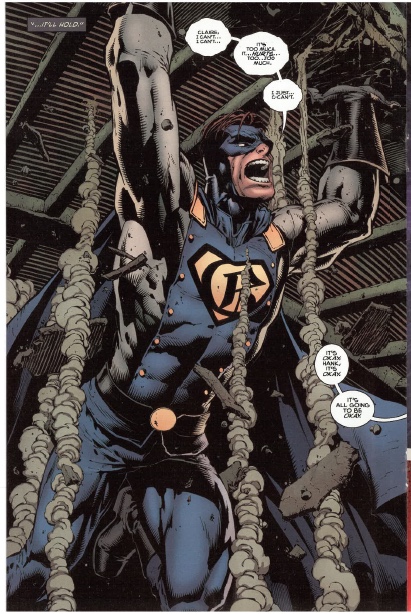
Each time Batman would save me. Teaching me that the inability to reach perfection needed to be punished until…
Not So Random Citizen: Kenny…Kenny…it’s okay. You’re allowed to cry in therapy.
Me: I’m afraid.
Batman: You’re not allowed to be afraid.
Me: I don’t want to do this anymore.
Batman: Fight the fear and it will go away.
Me: No, it won’t.
Batman: I can save you!
Me: No, you can’t. You have to die.
Batman: Good luck! You’re not the first to try and you won’t be the last to fail.
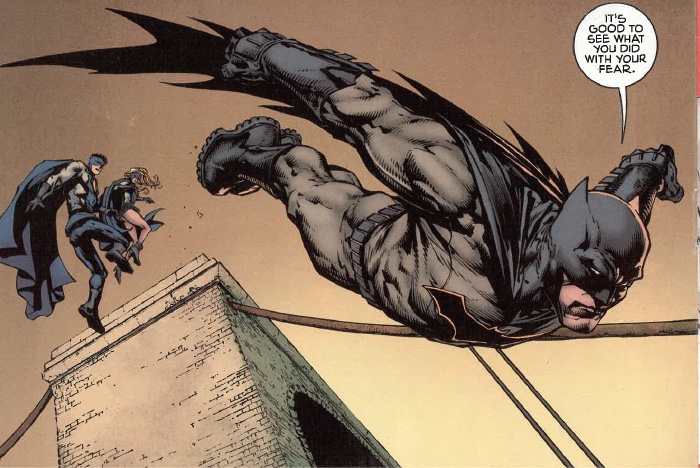
Not So Random Citizen: Let’s get started.
I Was Dead
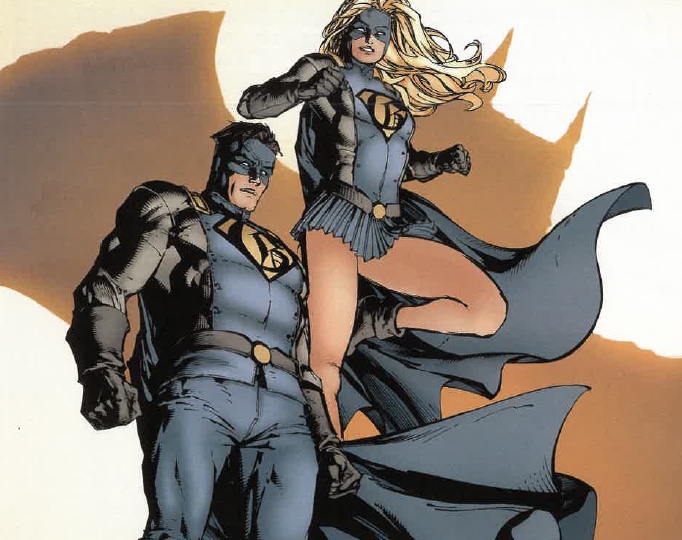
I don’t need saving!
You need saving!
Where were you at midnight with the screams and shadows? The ones he can’t forget. The impossibility of brother defeating father, resulting in a broken home.
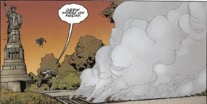
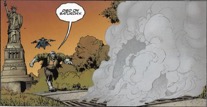
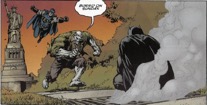
Where you there in the rain?

Which time?
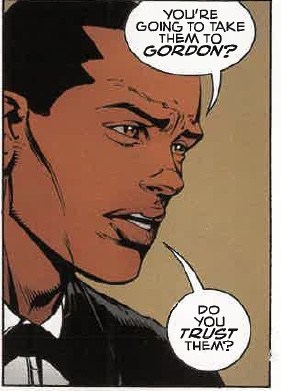
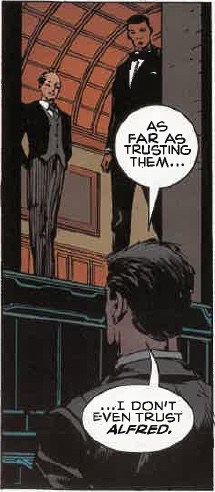
The time in the car where all he could see was the gleaming of red, yellow and green stop lights, the weight of the bag on his lap, and the pressure of siblings on either side. He wasn’t supposed to remember reaching Landmark and the defeat of his mother as she realized she had no options.
He does.
Or are you referring to the rain on his face and sweat in his shoes as he ran to Pat’s house to escape the dinner table. The conversation. The talk of divorce.
They always leave.
Either way, you weren’t there!
Where you there when he learned to trust no one, over, and over, and over again.

I’m not coming back home. I’m going to stay here at auntie’s house and then go to college down south.
Just do what they do in the movie. Like this. What we did was wrong and it never happened. I’m going to school down south. Remember to get your haircut every two weeks. I’m not going to therapy with you. Pack your bag, we’re leaving. I’m sorry, but they’re taking the house. Forget about it, there’s nothing you can do. It’s in the past. Forgive and forget. I’m leaving to go live down South. He’ll be alright. Don’t be a statistic.
No, you weren’t there. I was there, teaching him to control every situation. It’s the only way to survive, adapt. To get out!
Listen to what they say and watch the way they move to figure out what they think. It’s the only way to plan for the worst.
Run. Don’t think. Just run. Move. Escape. Do whatever you can. If you stop moving you’ll die.

What can you do? Help? Save me? How?
How can you save me – because I won’t be able to stop them.
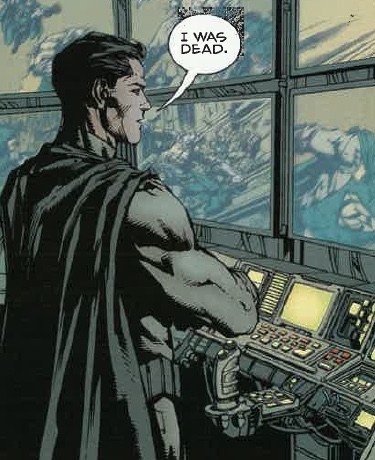
I can’t…
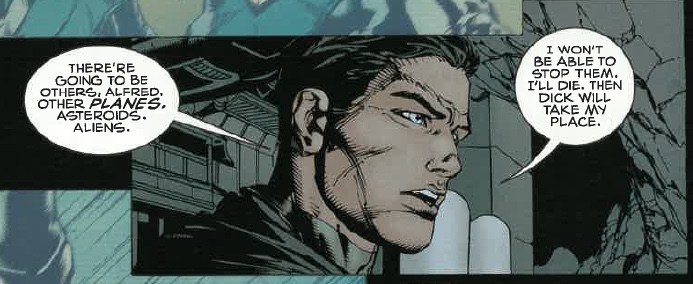
There’s nothing I can do!
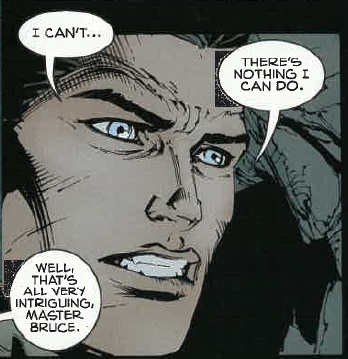
I’ll die and he’ll be left alone. He needs me to survive. He needs me.
I need him to survive.
Martry
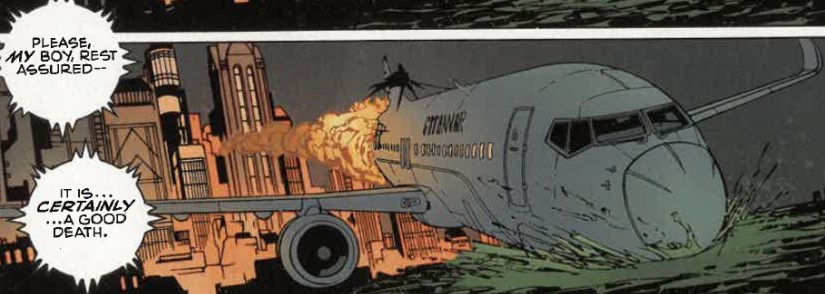
May times, this is how I feel. As if I’m standing on top of a renegade plane attempting to steer from a tethered strap on my belt. As the entire world races by, appearing to be in chaos, all I can do is hold on for dear life.
On the outside, I appear calm. And I should have it all together, right? I’m a man! I’m not allowed to feel fear, right? I’m not allowed to cry, love, or show any emotion besides happiness and anger, right? If I’m supposed to be Batman, if I’m supposed to be strong, intelligent, and calm, why do I have so much anxiety? Is this normal? Am I allowed to ask these questions, or does this make me less of a man?
From below, the world sees a man standing on top of a flaming airplane with reassurance that he has it all together when, in fact, he feels like an eight-year-old boy afraid to see what may appear on the other side of the approaching buildings.
So, what do I do? I hold on.
I sacrifice my mental health and well-being.
I scream, pray, and ask, “Is this a good death?”
I pray for impact. To give up. For it all to come crashing down and end. At least then I won’t feel afraid anymore.
I won’t feel like a failure.
In an attempt to kill my Batman, I become a martyr. I say to myself, “No one else will do it, so I will. I’m special!” I feel the glow and joy of accomplishment at succeeding where others failed. I feel superior, while faining humility. I say to myself, “I don’t expect them to do it! I can take more abuse because I was abused. I’m damaged goods, they aren’t. I was homeless, they weren’t. I hate myself, they don’t”
Arrogance transforms into spite, becoming hatred at being the person who always has to save the day. To carry the burden on my shoulders that no one asked me carry.
This won’t work.
I can’t kill my Batman through being a martyr. He has to become a survivor. I have to save him.
How?
Hero vs. Villain
How do you kill a hero?

A true hero.
A hero who has always been there to you – keeping you safe when no one else would put in the effort to give a damn.

A hero you love.
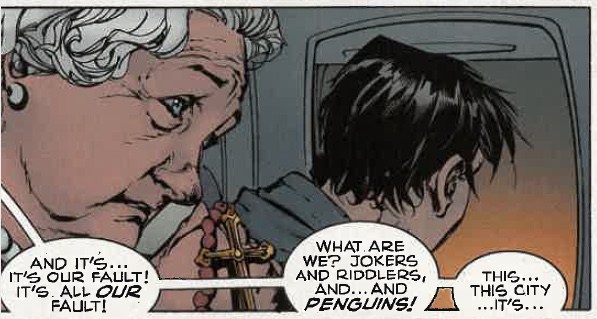
Will always love.
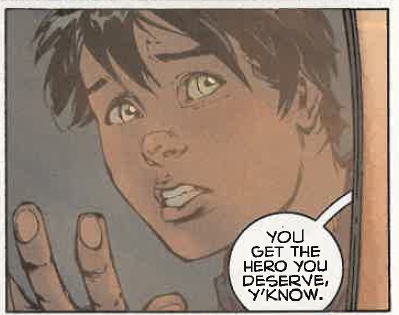
A hero who is not perfect, but one you believe you deserve.
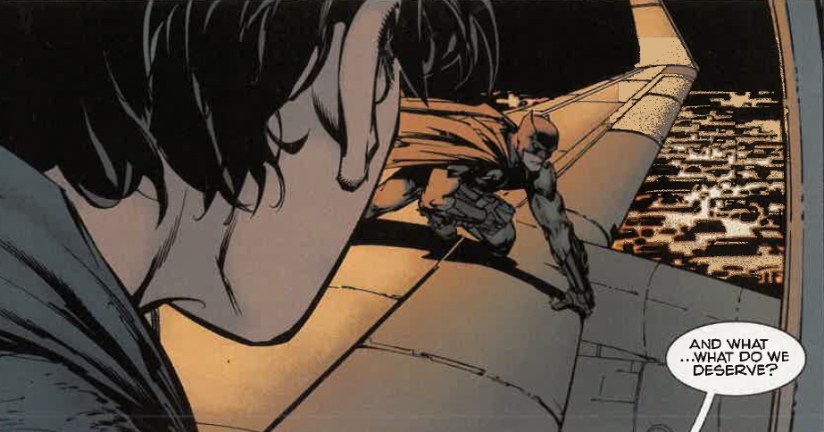
A hero who must die so that you, the survivor, can live.
Bullets deflect –
Blades never seem to penetrate deep enough.
Like a ghost, the hero always rises – to save you.

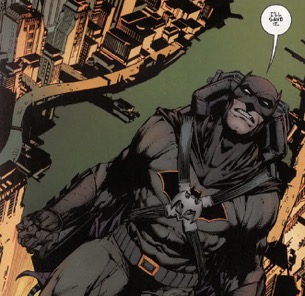
The hero knows more. Gathering information, piecing together clues you ignore to prepare for…
Panic!
Anxiety!
The hero remains calm. To him, it’s the same story different day. He’s been preparing, training since childhood. Since…the bad thing.

Preparing so you would not have to. So you could stay.

Remain –

a child.
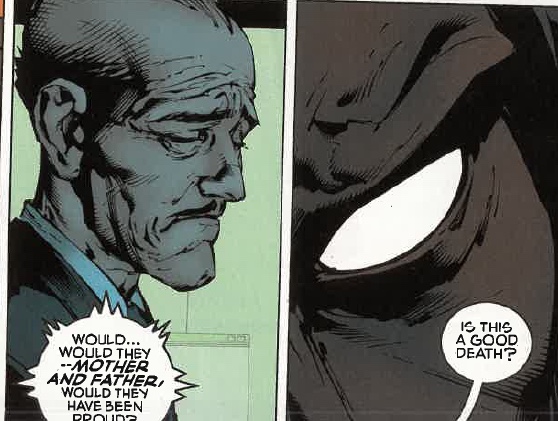
Waiting to be saved.
But who saves the hero?
Does he need saving?
Does he deserve saving?
Or does he deserve to die –
A good death?

An honorable death?
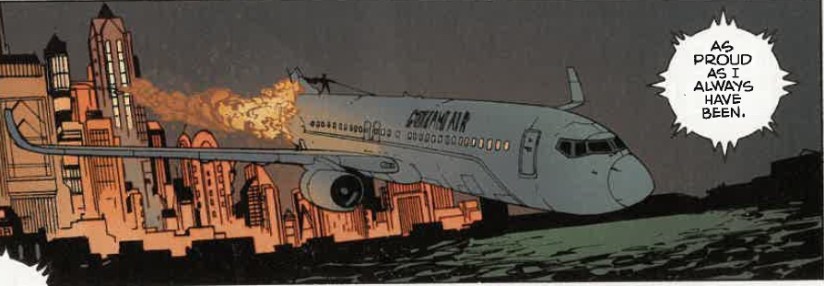
So that you, the survivor, can live…

And learn to save yourself.